
Title: St. Nicholas Book of Plays & Operettas (Second Series)
SECOND SERIES

THE CENTURY CO.
NEW YORKLONDON
Copyright, 1916, by
The Century Co.
Published September, 1916
Printed in U. S. A.
CONTENTS
| PAGE | |
| The Dream-Toy Shop | 3 |
| By Jessie M. Baker. | |
| Christmas Babes in the Woods | 10 |
| By Corinne Rockwell Swain. | |
| Which Shall Be King? | 29 |
| By Anna van Marter Jones. | |
| The Christmas Conspiracy | 44 |
| By Elizabeth Woodbridge. | |
| How Christmas Was Saved | 67 |
| By Catharine Markham. | |
| The First Thanksgiving Day | 89 |
| By Agnes Miller. | |
| Everychild | 101 |
| By Content S. Nichols. | |
| “Everygirl” | 111 |
| By Rachel Lyman Field. | |
| The Egyptian Cat | 122 |
| By Irene Woodbridge Clark. | |
| The Sleeping Beauty | 147 |
| By Caroline Verhoeff. | |
| Lord Malapert of Moonshine Castle | 164 |
| By E. S. Brooks. | |
| Little Folk in Green | 188 |
| By Elizabeth Woodbridge. | |
| A Friend in Need | 207 |
| By Maude Morrison Frank. | |
| The New Red Riding-Hood | 224 |
| By E. S. Brooks. | |
| The Babes in the Wood | 240 |
| By Laura E. Richards. |
THE ST. NICHOLAS BOOK OF
PLAYS AND OPERETTAS
CHARACTERS
| Little Maiden. | Two Dolls. | |
| Santa Claus’ Fairy. | The Kitty. | |
| Jack-in-the-box. | The Bunny. | |
| Two Soldier-boys. | The Teddy-bear. |
[Pg 3]
(A Christmas Playlet for Little Girls and Boys)
By Jessie M. Baker
Little Maiden’s Room on Christmas Eve
[In the bed at center the Maiden lies asleep in her little frilled night cap and gown. Her stocking is hung on the bedpost. At the left on a small table a tiny candle burns.
At the right is a large arm-chair with a picture-book and doll lying upon it.
Enter the Christmas Fairy at right. She wears a loose, white frock with crêpe paper wings and a wreath of holly, and carries a little silver, star-tipped wand.]
The Dream-toy Shop
[On the counter at background are a number of large toys, among them two little girls—one fair-haired, one dark—dressed as Dolls.
At the left of the counter stand two Soldier-boys with drums, paper caps, and epaulets.
At the right is a large, square, red box.
On the floor in front of the counter sits the black Kitty. He wears black tights, a little black jacket from beneath which his long tail curls, and a little black cap with pointed ears. [Pg 5]
At right foreground sits the Bunny. He is dressed in a white sleeping garment which covers hands and feet, and a little flannelette cap with long, upstanding ears which are wired and colored pink on the inside.
At left foreground on a little stool sits the Teddy-bear in furry coat and cap with little ears of cotton wool.

[Soldiers begin to march and drum stiffly at first and softly, but soon faster and noisily.]
[The Dolls dance a minuet, the little Maiden clapping delightedly, the Soldiers applauding with drums. Little Maiden spies the Bunny, runs over to him, and pats him gently. The Fairy touches him with her wand and he hops back and forth—while Soldiers, Dolls and Maiden applaud.]
[The Fairy touches him with her wand. He begins to turn about, displays his curly tail, and spits at the little Maiden when she slyly pulls it. Little Maiden strokes his back, and he sings a meow solo to the tune of “Auld Lang Syne.” All applaud.] [Pg 7]
[Fairy touches him with wand. He stands up, stretches himself, then sits on his little stool and sings:]
[All the Toys gather about as he sings. The little Maiden takes him on her lap and begins to croon in a motherly fashion. Suddenly a noise comes from the direction of the red box. Maiden, rising and taking Teddy-bear by the hand, begins to look excitedly about.]
[Again the noise is heard. Maiden runs over and touches lid of box. It pops open, showing a funny Jack-in-the-box holding a bag of candy under his arm.]
[As he sings, all the toys form in a line behind the little Maiden, and as they pass Candy-box Jack, he gives them each some candy from his bag. Toys return to places and little Maiden stands at center.]

[Jack jumps out of the Candy-box and places his hands on the shoulders of the little Maiden.]
[All dance the Norwegian Folkdance “Up to the Moon in a Rainbow,” using these words.]
[All sing.]
[As they finish there is the sound of a clock striking five. Candy-box Jack and all the Toys go back to their former places and remain motionless. Fairy softly leads Maiden out. Jack pops his head out and throws a candy kiss after her. She runs back to get it and waves good-by.]
[Curtain]
[Pg 10]

By Corinne Rockwell Swain
CHARACTERS
| Dick, a boy of nine or ten. | ||
| Betty, his sister, a little younger. | ||
| Queen of the Snow Fairies. | ||
| Pearl | |
Maids of Honor to the Queen. |
| Crystal | ||
| Jack Frost. | ||
| Santa Claus. | ||
| Snow Fairies and Holly Elves. | ||
COSTUMES
Betty and Dick may wear modern outdoor dress, with bright caps and sweaters; or, if preferred, something more old-fashioned and picturesque, such as “Greenaway” or “Cranford” costume.
The Queen and her Fairies are in white, with silver tinsel and crystal ornaments, and carry wands with silver stars. They may wear either trailing draperies, or short “Pierrette” dresses, with silver ruffs, rosettes, and little pointed caps.
Jack Frost; “Pierrot” costume of white or pale blue, with silver cap and ornaments.
The Holly Elves; “Pierrot” or “Yama-Yama” suits of green, with caps, ruffs, buttons and slipper-rosettes of scarlet. They carry branches of holly.
[Pg 11]
SCENE
The woods in winter. If scenery is not available, a generous supply of white sheets and cotton batting will make an effective setting, with a few small evergreens, and bare boughs. A large Christmas tree should be utilized as part of the scene; place it to right of center, and trim lightly with silver tinsel, “snow,” and glass icicles. Near the tree, a couch or seat should be built up and covered with white, to represent a little mound; upon this the Queen sits, and later, the children recline. The time is about sunset; a red light, if available, will be effective early in the scene, while toward the end it grows darker. A curtain is not absolutely necessary, although of course more “like a play.”
MUSIC
The airs mentioned may all be found in “Folk Songs and Other Songs for Children”; Oliver Ditson Company.
[The Queen and Fairies enter, dancing, to the air of “Come, Lasses and Lads.” The Holly Elves dance in from opposite side, and, with the Fairies, form a circle about the Queen, singing:]
[Pg 12]
[The Queen seats herself upon the mound as a throne, while the rest group themselves about her. Crystal, Pearl, and several others step to left, looking off intently, as though something attracted their notice.]
[They all hide, behind tree, in wings, etc. Enter, from left, Betty and Dick, dragging evergreen boughs. They move wearily, and pause near center, to look about them.]
[Betty standing facing R., wiping her eyes, but evidently trying to be brave. The Queen peeps at her from behind the Christmas tree, and she gives a startled cry.]
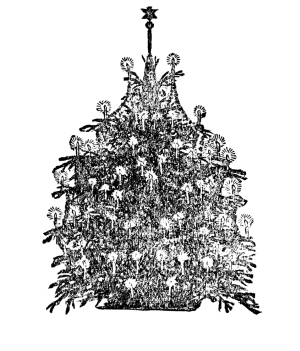
[They nod and finally doze, sinking into a reclining position upon the mound. The Fairies and Elves steal out cautiously, to soft music, and survey the children with curiosity. Then, coming closer, they surround the sleepers and sing; air, “Der Rothe Sarafan.”]
[Pearl and Crystal return with dishes heaped with snow dainties, which they offer to the children. They taste eagerly, then look at each other in keen disappointment.]
[Jack and Elves run off, Left. Shouts and a loud “Whoa!” are heard outside, and then Santa, enters, with a triumphant escort, and comes to front.]
[The children clutch one another in wonder and suspense, while the others nod their heads at Santa, with determination.]
[Santa and the children go off L. and the sleigh-bells jingle away into the distance.]
[The gifts are taken from the bag by the Queen and Jack Frost, and distributed among the audience by Fairies and Elves. If this ending is not desired, the “Hail to Santa Claus” chorus may be repeated after Santa’s exit, to the accompaniment of his bells, and the play closed in this manner.]
[Pg 29]
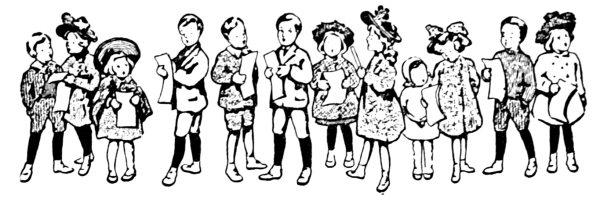
(A Christmas Play in One Act)
By Anna van Marter Jones
SCENE
Any stage or platform large enough to hold all the actors for final chorus and dance—with wings screened from view where players may sit when not on the stage. No curtain required, the only “stage setting” being a large chair at back of stage and twelve (or six) small chairs placed about the stage leaving center free.
CHARACTERS OF THE PLAY
Father Time, a tall boy in gown, with white hair and beard; carries a scythe and an hour-glass.
Herald, boy in page’s suit.
Jury, twelve or six boys and girls in school clothes, having dolls, teddy-bears, books or toys—as if meeting for play.
Master January, boy—suit of white—leggings, trousers, sweater, and stocking cap—trimmed with white cotton; carries a large, white-covered book on which Resolutions is printed in bold relief. [Pg 30]
Little New Year, tiny child, also in white, carrying sleigh-bells; one who can sing.
Miss February, girl—blue cap, white blouse, red skirt, the last trimmed with silver hearts and birds; carries a small flag and a large valentine.
Bluster March, boy—wearing overcoat, mittens, “pull-down” cap and tippet; carries a huge kite, a large top, and a bag of marbles.
Four Winds,[1] four smaller lads, who can sing; costumes: gray gowns with large kimono-like sleeves covering hands; and pointed hoods of same material.
Baby April, small girl—dress, lavender; a “red ridinghood” cape of pale green; carries some tiny white flowers.
The Princess May, tall girl—in pink gown, with wreath of green vines and pink flowers; carries wild flowers.
May’s Attendants,[2] six or twelve smaller boys and girls—in white costumes, who dance about her or do a simple Maypole dance.
Summer-hearted June, girl, in white with wreath of roses; carries large bunch of roses.
Jolly July, boy, in Uncle Sam suit; carries bunch of sky-rockets and toy pistol.
Miss Leisure August, girl, in outing costume—large hat, etc.; carries tennis racquet, fishing rods, and golf sticks.
School-day September, boy, in school suit, laden with huge strap full of school books.
Golden October, girl, in light brown dress trimmed with autumn leaves; carries basket of red apples.
Little Leaves,[3] six tiny girls in red and yellow dresses.
Harvest November, boy, in cook’s cap and apron; carrying, on a tray, a turkey.
Assistant Cooks, four boys similarly dressed, each bearing on his tray a portion of the Thanksgiving dinner described in his lines.
Dear December, a large boy, dressed as Santa Claus and carrying a small Christmas tree. [Pg 31]
Music throughout the play may be produced by a pianist, an orchestra, or a chorus of children. Any suitable selections may be substituted for those here suggested. The play moves on well with only piano interludes.
THE PLAY
[Enter, left wing, six or a dozen school children, talking, laughing, hurrying in. They discover Father Time standing at right front of stage, leaning on his scythe, and looking much disturbed.]
[The Children form ring and play drop the handkerchief, but rush at Father Time pell-mell when he returns.]
[Music and sleigh-bells heard. Short instrumental selection or sleighing song.]
[Enter Herald with Master January and the Little New Year.]
[Little New Year sings, “I am the little New Year.” Jenks’ Kindergarten Songs.]
[Exit January and New Year to left.]
[Music—A Patriotic Air played or sung.]
[Enter Herald and Miss February.]
[Exit February.]
[Enter Herald and Bluster March, followed by the Four Winds, who wave their arms like fans as they approach.]
[Exit March and the Winds.]
[Enter Herald coaxing little April to follow. She hangs back and seems so shy that Herald has to push her gently toward the Jury.]
[Exit April.]
[Music. May song sung or May dance played.]
[Enter Herald, Princess May and Dancers.]
[All bow. The dancers place the crown on May’s head and form for the dance which immediately follows. At its close May recites.]
[Exit May and train.]
[Music.]
[Enter Herald and June.]
[Exit June.]
[Music. “Yankee Doodle.” Drumming and noise of fire-crackers.]
[July rushes on to stage unannounced, shoots his cap pistol and says to Jury:]
[Exit July.]
[Music—Waltz or Boat Song.]
[Enter Herald and August.]
[Exit August.]
[Music. “School Days.”]
[Enter Herald and September.]
[Exit September.]
[Music. “October’s Bright Blue Weather.” Modern Music Reader, Book II.]
[Enter Herald and October.]
[Enter little Leaves, dancing to front of stage where they sing “Come Little Leaves.” Kindergarten Song.]
[Music. Song—“Come, ye thankful people.” Any Hymnal.]
[Enter Herald, followed by chief cook November and his assistants.]
[Exit November and the cooks.]
[Bells are heard and a Christmas carol outside.]
[The Jury exhibit great excitement and show by pantomime that they know what is coming now.]
[Enter Herald followed by Dear December.]
[The Jury rise in haste and clapping hands rush to meet December, shouting:]
[The others return and passing before December salute him with low bows and curtsies, forming two circles about him. When all have come they dance about December, singing—“Hail, Old Father Christmas.” Modern Music Series, First Book.]
[At the final phrase of the chorus all wave a good-by to the audience.]
[Pg 44]
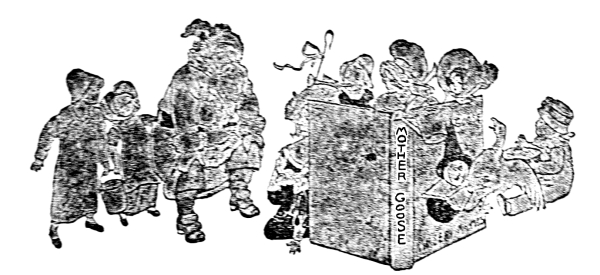
A Christmas Play For Boys and Girls
By Elizabeth Woodbridge
CHARACTERS
Real Children, Harry, Nell, Bobby, Dot.
Mother Goose Children, Jack, Jill, Miss Muffet, Boy Blue, Simple Simon, Jack Horner, Bo-Peep, Mistress Mary Quite Contrary.
Mother Goose.
Santa Claus.
SCENE
A dimly lighted sitting-room, showing a fireplace and at least one window. Leaning against the wall beside the fire place, a huge book of nursery rimes, with a picture of Mother Goose on the cover.
TIME
The night before Christmas.
[Enter Harry and Nell, with stockings to hang up.]
Harry. Come on! Let’s hang ’em here!
Nell. Where are Bobby and Dot? [Pg 45]
Harry. Hi, Bobby! Hi there, Dot! Come along! We’re going to hang up our stockings now. [They go back to entrance and draw in with them two smaller children, the smaller the better, and help them hang up tiny stockings, then lead them out and return themselves—all this in dumb show, or the children may say a few words, whatever is most natural. It is better for them not to learn set speeches for this part of the business. After rearranging the stockings, Harry and Nell sit down by the fire.]
Harry. What do you s’pose he’ll bring us?
Nell. I don’t know. Oh, dear! I wish it was morning!
Harry. I want a new sled. Mine’s all broken.
Nell. I want a new doll’s crib. My littlest dolly hasn’t anywhere to sleep except a bureau drawer.
Harry. Mother said you needed a new pair of eyes—ones that won’t cry so easily.
Nell. She said you needed a new pair of hands—the kind that won’t slap and pinch people.
Harry. [Reaching out and drawing the Mother Goose book over to him, and pointing to the cover.] I think Mother Goose needs a new cap. Hers has never looked like much since we spilt molasses candy on it.
Nell. Oh, if Santa Claus ever brought the Mother [Pg 46]
Goose people anything—they all need things. [She draws closer to Harry, and they open the book between them.] Miss Muffet’s footstool has holes through it, look! Mother says I poked those with the scissors when I was little.
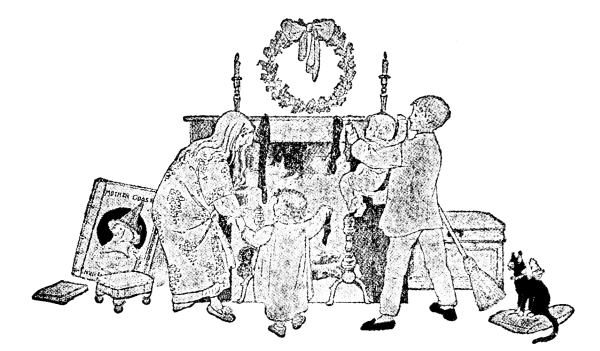
Harry. [Turning a page.] And Boy Blue needs a new horn. He must be tired of that tin one.
Nell. [Turning another page.] And poor Bo-Peep! She’s had that same ribbon on her crook ever since I was a baby!
Harry. [Turning again.] And Jack and Jill have been banging that pail around down that hill for years and years. It must leak like everything.
Nell. I don’t believe Santa Claus ever thought of them. If he did, he would bring them things, I know he would. [Pg 47]
Harry. How can he think of them when they don’t hang up any stockings!
Nell. Poor things!
[A voice from outside calls, “Children!”]
Harry and Nell. [Getting up.] There’s Mother! [They drop the book and get as far as the door, when Nell catches Harry’s arm and turns back.]
Nell. Let’s take the Mother Goose people with us. They’ll feel so badly to see Santa Claus stuffing our stockings when he doesn’t give them anything—and most of them are children, too. [She picks up the book, and Harry takes it. Both go out. Silence. Finally Jack and Jill appear in the doorway, looking in. After a careful survey of the room, they tiptoe in cautiously, go to the fireplace and look up it, feel of the stockings, go to the window or windows and peer out. All this time they hold between them an old tin pail.]
Jack. [In a loud whisper.] He hasn’t come yet.
Jill. I suppose he might come ’most any minute.
Jack. We do need a new pail, sure enough. Look at this one! We couldn’t carry a cupful of water in it, even if we didn’t tumble down.
Jill. And we don’t usually tumble down, of course. It was just that once. [Pg 48]
Boy Blue. [In the doorway, loud whisper.] Hello, Jack! Hello, Jill! Anybody else here?
Jack and Jill. Hello, Boy Blue! Come in!
Jack. We were just talking about Santa Claus.
Boy Blue. [Entering.] Oh, you heard what the children said. So did I.
Jill. And we do need a new pail.
Jack. [Holding out pail.] Look!
Boy Blue. Yes, I suppose you do. But look at my horn! It’s all battered up climbing stone walls after those tiresome cows.
Jill. Of course!
Boy Blue. And once I dropped it down the well. I was helping Johnny Stout get that pussy-cat out that Tommy Green put in.
Jack and Jill. Horrid boy, that Tommy Green!
Boy Blue. And it really hasn’t tooted very well since then.
[Miss Muffet, a very little girl, appears at door. She holds a little stool or hassock under one arm, and in the other hand a string, from which hangs a large, black spider.]
[Pg 49] Jill. Why, here’s Little Miss Muffet, too! [Jill goes over to door, takes her hand, and leads her in.] I do believe she thinks she needs a new tuffet. Is that it, Miss Muffet?
Miss Muffet. Yes. Look at it! And I need a new spider, too.
Jack. [Examining the spider.] Why, that looks to me like a perfectly good spider. What’s the matter with your spider, Miss Muffet?
Miss Muffet. He’s black. I’m tired of a black spider. I want a yellow one—a big, yellow one.
Boy Blue. Well, I never knew Miss Muffet cared what kind of a spider it was.
[Simple Simon appears at door, hesitates.]
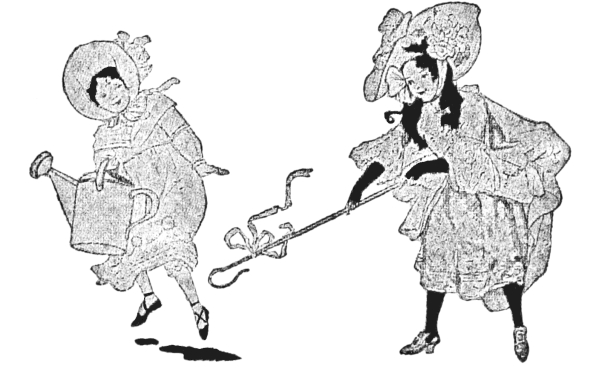
[Pg 50] Jack. Oh, there’s Simple Simon! Come in, Sim, my boy! We’re all talking about what we want. What do you want?
Simple Simon. [Entering slowly and speaking with a drawl, or perhaps a stammer.] I’ve always wanted lots of things—especially pie. But I never had any pennies.
Boy Blue. [Briskly.] Then what you want is pies,—or else pennies,—which would you rather?
Simple Simon. Pies.
Jack Horner. [Entering in time to hear the last two speeches.] Here! Take mine! I picked out all the plums years ago. [Simple Simon takes the pie, and retires to back of stage to eat it.]
Boy Blue. Hello, Jack Horner! What do you need?
Jack Horner. [Turning to the others.] What I need is a new pie.
Mistress Mary Quite Contrary. [Entering.] And what I need is a new watering-pot. [Pettishly.] Look at this old thing!
Bo-Peep. [Entering.] There’s Mistress Mary, quite as contrary as usual! But, now really, children, no joking, I do need a fresh ribbon. You all heard what Harry and Nell said. They noticed it. I suppose everybody has.
Jill. [Patronizing but friendly.] Yes, Bo-Peep, we all[Pg 51] noticed, only we’ve been too polite to speak about it. [Confidentially, with an air of wisdom.] Have you ever tried dampening it and pressing it?
Bo-Peep. Yes, Mother Goose does that for me every little while.
Jill. But it is badly faded, isn’t it?
Bo-Peep. Of course it is! How could it help being? I’ve been chasing those sheep for years, out in the hot sun, and hooking their legs—like—like this!
[She reverses her crook and begins hooking it around the children’s ankles. They hop and run to escape her. Screams and laughter.]
Mother Goose. [Entering, waving her stick at them.] Children! children! What are you doing? You’ll wake the house! And Santa Claus may pop in any minute and catch you! And then what!
All. Catch us? What fun!
Jack. Perhaps we’d catch him! We’d make him give us a new pail, wouldn’t we, Jill?
Bo-Peep. And me a new ribbon.
Boy Blue. And me a new horn.
Mistress Mary. And me a new watering-pot.
Jack Horner. And me a new pie.
[Pg 52]
Simple Simon. I’d like some pie, too.
Jack. And Miss Muffet, here, wants a new tuffet.
Miss Muffet. And a new spider—a yellow one.
Mother Goose. What children you are! Poor old Santa Claus! Hasn’t he enough to do now, without your teasing him for things?
Jack. But he never gives us anything.
All. Harry and Nell said so, too.
Jill. And they said he surely would if he only thought.
Jack. [Facing the rest, and striking an attitude.] Let’s make him think!
All. How? how?
Jack. All hide here, and wait till he comes, and then jump out at him, and capture him.
All. Oh, what fun! Let’s! [They turn to Mother Goose.] May we? may we?
Mother Goose. If you promise you won’t hurt him.
All. Oh, we won’t; we won’t.
[They prance with glee, then take hands and circle around Mother Goose, singing:]
[Pg 53]
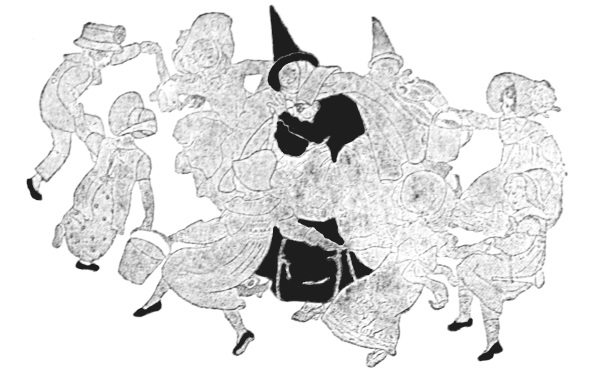
[Pg 54]
[After the song, they stop and listen. A sound of distant sleigh-bells is heard. The children scatter and hide behind the furniture or in dark corners. Mother Goose retires to entrance door and stands in its shadow.]
[The bells sound louder, then cease. The window is opened slowly. Santa Claus enters, sets in his pack, goes out again and brings in a big sled, closes window and comes forward to fire, rubbing his hands.]
[Pg 55] Santa Claus. Such houses! A fellow has to prowl and prowl around a house like a thief to find a place to get in. Look at that chimney! They’ll expect me to come in on the telephone-wire next. Well—here are the stockings—one—two—three—four.
[At a signal from Jack, the children creep out and spring upon Santa Claus from behind. They pull him down, hold his hands and legs, and pull him to a big chair in the middle of the room. Meanwhile Santa Claus calls, “Help! help! murder!” Jack at length stops his mouth by winding a handkerchief about his head. This Jack does leaning over him from behind.]
Jack. Now, Santa Claus, it’s no use to wiggle and scream. You’re caught. Will you be good and quiet? If you will, hold up both hands, and waggle the fingers. [Santa Claus does so.] All right. [Jack takes off handkerchief and comes around toward front.] Now, listen. We don’t mean any harm—
Santa Claus. Oh, you don’t, you young scamps! [Pg 56]
Jack. [With dignity.] We’re not scamps, and we promised Mother Goose here not to hurt you, and we haven’t.
[Mother Goose comes forward a little.]
Santa Claus. You’ve hurt my feelings, terribly.
Jack. Not half so much as you’ve hurt ours.
Santa Claus. What? What’s this?
All. You never gave us a present.
Jill. Never in all our lives.
Bo-Peep. And we feel badly.
Boy Blue. Terribly.
All. Terribly.
Miss Muffet. [Coming up to his knee.]
And I want a new
tuffet, and a new spider—a yellow one.
Jack. Jill and I want a new pail. Look at this one!
Bo-Peep. And I need—I really need—a new ribbon for my crook.
Boy Blue. And I need a new horn.
Mistress Mary. And I need a new watering-pot for my garden.
[Pg 57]
Jack Horner. And I’m just starving for a new pie. There weren’t any plums left in mine, and I gave it to Simple Simon here.
Simple Simon. I’ve been wanting pie for a long time. But I never had any pennies.
Santa Claus. [Looking about at them, half amused, half vexed.] Why, you midgets! you little ruffians! Do you mean to say you’re holding me up for presents! Me! Santa Claus! The children’s friend! Held up here by force, in the dark—by a set of—of highway robbers! Aren’t you ashamed?
All. [Gathering around and pointing fingers at him, very
impressively.]
Aren’t you ashamed?
Miss Muffet. I want a new spider—a yellow one.
Santa Claus. You do, you little minx, you little Muffety minx!
Come here!
Do I look as if I kept yellow spiders in that bag?
Miss Muffet. I want a new spider.
Santa Claus. Listen to her! A yellow spider!
Miss Muffet. And a new tuffet.
Santa Claus. And a new tuffet! dear! dear!
Jack. [Severely.] You promised to be good.
Santa Claus. Mother Goose, what do you think of the way you’ve brought up these children? [Pg 58]
Mother Goose. Well, Santa Claus, I can’t help it. Children take things pretty much into their own hands nowadays.
Santa Claus. So you won’t stand by me! [To Miss
Muffet.]
And you stand there waiting for your new spider!
Miss Muffet. And my tuffet.
Santa Claus. And your tuffet.—Jack, bring me my bag.
All. Hurrah! He’s going to! he’s going to!
[Jack, with the other boys, brings over the pack and sets it down before Santa Claus, who opens it and begins to feel about in it. He pulls out a new little stool or hassock.]
Santa Claus. Here, Miss Muffet! Here’s your new tuffet. Sit down and see if it fits you. [Miss Muffet sits down between his knees, facing audience. Santa takes out large yellow spider on string, and dangles it down over her head, lowering it slowly until she catches sight of it. She screams, and runs to the far corner of the room.]
Santa Claus. Why, Miss Muffet! I thought you said you wanted a yellow spider!
Miss Muffet. [Coming slowly back.] I was used [Pg 59] to a black one. [Takes new spider by the string, gingerly, and sits down on new tuffet at Santa’s feet.]
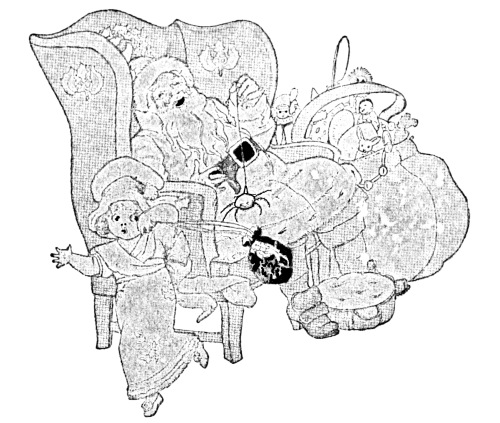
Santa Claus. Here, Jack, here’s a new pail. And be more careful with it this time. Don’t bang it around downhill so. [Jack takes it, starts to carry it over to Jill, stumbles, and falls flat, flinging pail all across room.]
Santa Claus. There you go again! What’s the use of giving you a new pail? Jill, take care of it for him! [Takes out fresh ribbon.] Here, Bo-Peep, here’s your ribbon. [Bo-Peep [Pg 60] takes it, curtseys, and goes back beside Jill, who helps her take off the old ribbon and tie on the new one.]
Santa Claus. Here, Mistress Mary, here’s a new watering-pot for you. Now let me see you smile. [Mistress Mary smiles and curtseys.] Here, Jack Horner. [Giving him a pie.] There are lots of plums in this. But you mustn’t pick them all out first. You must take it just as it comes. Didn’t your mother ever tell you that?
Mother Goose. Of course I’ve told him.
Santa Claus. Here, Simon, my boy. Here’s a pie all to yourself. And here are some pennies to buy more. Don’t let the pie-man cheat you. You have had a rather hungry time, haven’t you?
Simple Simon. Yes, sir; thank you, sir.
Santa Claus. Here you, Boy Blue! Here’s a new horn. See how it sounds.
[Boy Blue toots horn, marches around Santa. Children all fall in and march around him once or twice. Then horn stops, and they sing the same song as earlier, only with changes of tense:]
Santa Claus. Here, you rascals, help me fill these stockings! Make yourselves useful! [They fill stockings. Sled and doll’s bedstead are set up beside the fireplace.] Now, run! Scamper! It’s almost morning. Get back into your book, or you’ll get caught. Run! Off with you! [They all run out.]
Santa Claus. [After a moment’s pause.] Mother Goose didn’t ask for a new cap, but I think she needs one. That molasses candy does make it look rather queer. [Goes through door, returns with Mother Goose book. The picture of Mother Goose on the cover now has a bright red peaked cap instead of a brown one. Santa Claus sets book up beside fireplace, and turns to the audience.]
Santa Claus. Merry Christmas to all, and to all a good night.
[Exit. Sound of sleigh-bells, becoming fainter, then silence, or Curtain.]
[Early morning. Enter Harry and Nell.] [Pg 62]
Harry. There’s my sled. [Darts across room toward the sled. Nell runs after, snatches his arm, and pulls him back a little, pointing to the Mother Goose book with her other hand.]
Nell. Oh, Harry, wait a minute! Look!
Harry. Look what?
Nell. It’s red!
Harry. What’s red?
Nell. The cap. Don’t you see? Mother Goose’s cap.
Harry. That’s soo! Let’s see about the others!
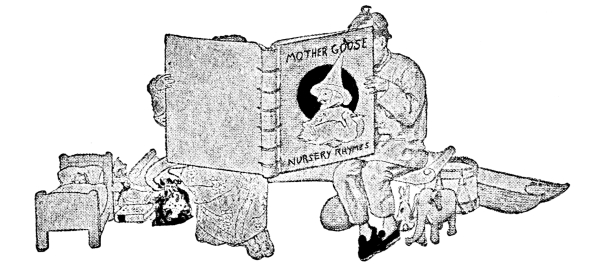
[They sit down side by side with the book before them. As they talk they turn the pages.]
Nell. Look! Boy Blue has a new horn! It used to be tin.
Harry. And Miss Muffet’s tuffet hasn’t any holes in it! [Pg 63]
Nell. And, sure as I live, her spider is yellow! It used to be black. And see! Jack and Jill have a new pail—there’s only one dent in it!
Harry. And just look at Bo-Peep, will you! She has a pink ribbon instead of a blue one!
Nell. And Jack Horner’s pie hasn’t any thumb-holes in it! And Simple Simon has a pie, too! Santa Claus must have heard what we said about their needing things!
Harry. I wonder if he heard me say you needed a new pair of eyes.
Nell. [Looking at him, eyes very wide and excited.] Do they look new?
Harry. Yes, awfully shiny. I might pinch you, and see if they cry.
Nell. Don’t you dare! Anyway, maybe your hands are new, and if they are, they won’t pinch people, of course.
Harry. [Looking at them.] They don’t feel a bit like pinching now, really.
Nell. Let’s tell Mother, and show her the book. [They run out with book. Return without it, run over to fireplace and take down their stockings. Holding these, they take hands, and coming toward the [Pg 64] front, sing, to same music as before. As they sing, the Mother Goose children steal in behind them and join softly in the song:]
[When the song is over the Mother Goose children run out quickly. Nell looks around, as though listening or looking for something. Looks puzzled.]
[Pg 65] Nell. I thought I heard somebody.
Harry. No, you didn’t. Let’s look at our stockings!
Nell. All right. Only let’s get Bobby and Dot first. Maybe they’re made new, too!
Harry. You couldn’t tell if they were. They’re almost new just as they are, you see.
Harry and Nell. [Go to door, call.] Oh, Bobby! Oh, Dot! Come along! Come and see your stockings!
[They go out and lead in Bobby and Dot. Grand scramble for stockings. Exit with stockings, or Curtain.]
GENERAL REMARKS ABOUT PRACTICAL DETAILS
The play may be given without a curtain, but if one is available, it may be used at the beginning and end. In the middle, it is better not to use it, as the quiet, empty room is much more impressive than any curtain could be.
The two littlest “real children” may be two or three years old, as they can be piloted through their parts by Harry and Nell. The part of Miss Muffet can be taken by a child of five or six years. Harry and Nell and the other children may range from nine to fourteen years. Santa Claus and Mother Goose may be taken by a big boy and girl, or by “grown-ups.”
COSTUMES
For the two smallest children, long nightgowns; Harry, striped pajamas; Nell, a long white nightgown and over it a gaily colored wrapper. The [Pg 66] Mother Goose children to be dressed as nearly like their pictures as possible. In general, the Kate Greenaway style should be followed. The boys wear tunics of cheese cloth, over their own loose knickerbockers, the tunics loosely belted in. Broad white Puritan collars and cuffs may be cut out of stiff white muslin. Their edges need not be finished, as they hold very well.
Miss Muffet, pink and white, exactly like the pictures; Bo-Peep, a shepherdess costume of figured blue-and-pink cretonne over a blue skirt, and big white hat. Jill, a real Kate Greenaway girl, in blue and white; Mistress Mary, also Kate Greenaway, in yellow and white. Mother Goose, a black waist, with big white fichu, black overskirt over red underskirt, high-peaked hat, made by rolling stiff brown paper into a cone, cutting it even around the bottom, and fastening it to an old hat crown which has a narrow rim of black velvet. The joining is covered by a narrow band of gilt paper pasted on.
The Mother Goose book should be made for the occasion, out of Bristol-board or corrugated packing board, with pages made of brown wrapping-paper, and the cover picture of Mother Goose pasted upon the outside. The change in the color of the hat is easily effected in this way: the hat in the cover picture is painted red in the first place. Then a bit of brown paper cut the same shape as the peak is lightly pasted on over it. After the book is taken off the stage by the children, this bit of paper is pulled off, so that when Santa Claus brings the book in again, the hat is red. The inside pages of the book, of course, are never seen at all by the audience.
Real toys are put into the stockings, so that the joy of the “real children” in pulling the things out, especially of the two-and three-year-olds, is entirely genuine and spontaneous.
If it were desired to use fewer characters, one or two of the Mother Goose children can easily be cut out. If more characters are wanted, they can be added, such as Old King Cole, needing a new bowl; Tom, Tom, the Piper’s Son, needing a new pipe; the Queen of Hearts, needing a new batch of tarts, etc. [Pg 67]
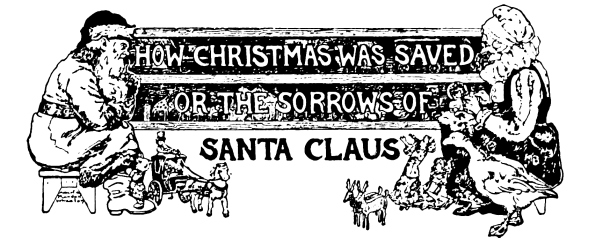
(A Christmas Play)
By Catharine Markham
PLACE
The home of Santa Claus near the North Pole.
TIME
The week before Christmas.
CHARACTERS
| Santa Claus. | Robinson Crusoe. |
| Mother Goose. | Friday. |
| Jennie Wren, sewing girl. | Captain Kidd. |
| Jack Frost, man of all work. | Robin Hood. |
| Dame Rumor. | Man in the Moon. |
| Mother Shipton. | The Clerk of the Weather. |
| William Tell. | Dick Whittington. |
| Lo, the Poor Indian. | Pocahontas. |
[Mother Goose and Jenny Wren at left, busily sewing. Tables and shelves piled high with toys. White skins on floor. Sparkling chandeliers, candles, etc.]
[Pg 68] Jack Frost. [Dressed in white with spangles, pointed cap, pointed shoes, and wand. Enters at right with rush and whoop, scattering snow and breaking icicles.] Hello, Mother Goose. Hello, Jennie Wren. Oh, but I’ve had a hard time chasing up his reindeer for Santa Claus! I’ve got them herded into a mossy field over in the corner of Iceland, and I hope they will stay awhile now.
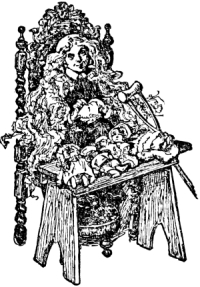
Jennie Wren
Mother Goose. [Sweeping up the litter made by Jack.] Dear me, Jack, what is the need of coming in in such a bluster and mussing the house this way?
Jack. Excuse me, Mother Goose. I just keep forgetting. My, but it is hot here! It almost gives me chilblains. Actually, the thermometer is only five degrees below zero in this room. I should think you’d melt, Jennie. [Opens a window, tweaks Jennie’s ear. Starts to skate across the room and falls down.]
Jennie. [With a start.] Why, Jack, how did you come to fall?
Jack. Oh, not-with-standing, Jennie. [Turns a handspring.] [Pg 69]
Jennie. Oh, Jack, what a bad pun! Now see if you can’t subside and not make any more trouble for Mother Goose. You know it is only three more days before Santa has to start off with his pack, and there are many things for you to do to help him get ready.
Jack. Oh, excuse me, everybody. I wish I could learn calm, cool manners. Maybe I could behave better if I wasn’t so hungry. Couldn’t I have something to eat? I haven’t eaten a thing since breakfast but three tallow candles, and I’m starving.
Mother Goose. Yes, you shall have a little snack right now, Jack, as supper will not be ready for some time yet. You must attend the door to-night, as the Auld Lang Syne Club holds its annual meeting here this evening, you know. [She hurries out.]
Jack. I wish Santa would let me run the wireless, instead of always having me tend reindeer.
Mother Goose. [Entering with tray.] Here, Jack, is a little luncheon for you—a bowl of ice-cream, a piece of frosted cake, and some iced tea.
Jack. [Seating himself.] Oh, Mother Goose, you are the best cook at the Pole. Oh, how good and cold everything tastes. But where is Santa? I thought he was too busy to leave home to-day.
Mother Goose. He went out a little while ago to see if there were any messages at the Wireless Station. He thinks he has at last got [Pg 70] the wireless line in working order. It runs from the Pole now to every school yard in the country, you know. He expects great fun in hearing the children of the world planning for their Christmas trees and stockings. There will be no more mistakes in presents now, for every boy and girl will get just what Santa hears him or her wishing for.
Jennie. [Looking out.] Why, here comes dear old Santa now, and he looks quite sad. I wonder if the wireless line is out of order after all the trouble he has had trying to get connections made.
Santa. [Enters and flings himself in easy-chair.] Well, Mother Goose and Jennie, you can put away your needles, and Jack, just turn the reindeer loose again. There will be no Christmas gifts for anybody this year, nor any other year.
All. No Christmas gifts! Never again any Christmas gifts!
Santa. That’s what I said. Never again any Christmas gifts! Santa Claus will never be seen away from the North Pole again!
Mother Goose. Why, Santa, you might as well say there will be no more skating or coasting. Winter without Santa Claus and Christmas is unbelievable. I can’t bear to think of your never again carrying Christmas gifts to the children. How can you think of stopping that custom? [Pg 71]
Santa Claus. I feel just as bad as you do about stopping my annual visit and my gifts. Ever since I can remember I’ve been distributing gifts to children at Christmas time; and until an hour ago I expected to keep it up always, but now Santa Claus and his Christmas rounds are at an end forever!
Mother Goose. But what has happened, Santa, to put this into your mind? Have you had a fall on the ice and do you feel a little dazed?
Jennie. This is one of your jokes, Santa.
Jack. Oh, come off, now, Santa. You almost gave me a chill. Let’s get a big box of those drums and whistles packed up for the sleigh.
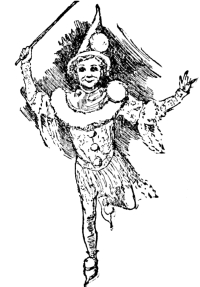
Jack Frost
Santa Claus. No; I am in dead earnest. My head never was clearer. I’ll tell you how it is. You will hardly believe me, but up at the Wireless to-day, I got the shock of my life. I went up and sat on an iceberg at the foot of the Pole to listen to what the children of different playgrounds were saying about Christmas, and what gifts they expected, and so on. I had my note-book ready to write what this one and that one wanted. And—oh, I can hardly tell you—I heard children [Pg 72] from three different cities talking about Christmas and saying they did not believe in Santa Claus.
All. Not believe in Santa Claus? Impossible! Preposterous! And that, too, after all the gifts—dolls and Noah’s arks and bags of candy you have scattered around the world!
Jack. Maybe they think I have been chasing reindeer to the end of the rainbow for—nobody!
Santa Claus. I knew you’d hardly believe it. I would not believe it myself if I hadn’t heard the words just as plainly as I hear you all talking now. One little girl in Boston was talking to quite a lot of little comrades. “Pooh,” she said, “no well-informed person nowadays believes in Santa Claus. Santa Claus is only a medieval myth”—
Jennie. Medieval! What’s that? There’s nothing evil about you, Santa. You are just three hundred pounds of solid goodness.
Santa Claus. Oh, Jennie, I thought they all loved me as you do; and it is hard to find they don’t believe in me, after all my years of Christmas visits.
Mother Goose. Go on, Santa dear. What else did you hear over that horrid wireless line?
Santa Claus. Well, some boys were talking in a school yard in Chicago, and one of them said loudly: “You can’t fool me. There isn’t [Pg 73] any Santa Claus, and there never was. He is nothing but a picture in the books, like Uncle Sam!” And he was a boy with a pair of mittens on his hands that I’d given him last Christmas. He was that curly-haired boy I think, Jennie, that you’ve been knitting mittens for ten years, each year a size larger.
Jennie. Oh, isn’t he ungrateful? And here I have another pair almost finished for him this year, too. [Holds up red mittens.]
Jack. I’ll give that fellow a nip yet. I’ll make him believe in me, anyhow!
Mother Goose. Those certainly were cruel speeches, Santa. But let us hear the worst. What else did they say?
Santa Claus. Some little girls in Los Angeles were at the school gate and I heard one saying, “Oh, Santa Claus will do for babies. But when you are seven you ought to say he’s just make-believe, like the Sand Man and such folks.”
Mother Goose. I don’t wonder you feel hurt, Santa, after all your kindness to children. But you must remember that these were only three out of all the school yards in the country. There must be hundreds of other children who do believe in you. Perhaps these just happened to be the few who don’t believe in fairies, either. There are some such strange children I have heard. [Pg 74]
Jennie. Oh, Peter Pan will convince those foolish children who don’t believe in fairies.
Mother Goose. Never mind, Santa. I am sure there cannot be many children of that unbelieving kind. But I wish you had never had your wireless rigged up. It seems only to make you unhappy.
Santa Claus. [Sighing.] It has made me unhappy. I never felt so sad in all my life before. I shall order the wireless telegraph discontinued to-morrow. I shall give up the wireless line and the Christmas business altogether—Dear me, how lonesome I shall be for the children!
Mother Goose. I shall not be sorry to have you give up the wireless line, Santa. I can’t bear to think of your stopping this lovely custom of gift-giving. You have made so many children happy, and so many little believing hearts will miss you.
Santa Claus. It does seem sad, Mother Goose. But I shall never have the heart to set out again at Christmas time with the bells jingling, and the reindeer galloping and the sleigh flashing over the snow. I shall never again go crowding down the chimneys to cram stockings and load the children’s trees. All that pleasure is over forever, and I used to be so happy and so busy at Christmas!
Jack. But I should think you would be glad enough to give up that stunt of scrooging down chimneys. Suppose you’d get stuck some night! [Pg 75]
Jennie. I’m sorry for the children who will expect you, Santa, but I am glad you will not have to work so hard any more. You have given your whole time to getting ready for Christmas, just to make other people happy.
Santa Claus. Oh, I’d gladly take all the danger and all the trouble of that Christmas journey and all the work of getting ready for it, if I were sure the children would care to have me come. But to be just an intruder, it is too much. I shall never go Christmasing again. Never, never, never!
Jennie. Oh, Santa, don’t be so sure of that. Let’s think it over. If you don’t go, what shall we do with all these toys and dolls in the attic and cellar and on the shelves here?
Santa Claus. Oh, have a rummage sale of them, Jennie.
Jack. But what use shall we have for the reindeer that I have been watching all year?
Santa Claus. Oh, give them to the Peary expedition when it gets to the North Pole. Really, I’d be glad to go just as I always have if I thought I was welcome; but you see how it is! I must not intrude where I’m not wanted.
Mother Goose. Santa, don’t decide yet. The Auld Lang Syne Club, as you know, is to meet here to-night. Let us [Pg 76] put the case before those old friends and hear what they advise. What do you say to that?
Santa Claus. That is a good suggestion. These people of the Auld Lang Syne Club have all had experience in the world. They will be able to give me an expert opinion. I will do whatever they all seem to think best.
[Same scene an hour later. Santa Claus, Mother Goose, and Jennie Wren stand in a row, center, shaking hands with guests. Jack Frost at door shouts names of guests as they appear R. at ring of door bell.]
Mother Goose. I do love to have the Auld Lang Syne Club meet with us. Santa, you must try to look a little pleasanter. Just as soon as the guests are all here we will tell them our troubles and be guided by their advice. So let us now cheer up and act as if nothing sad had happened.
Jennie. Your collar is a little crooked, Santa. Now let the smiles come. There, you look better.
Jack. The Man in the Moon.
[Enter The Man in the Moon, lantern in hand, yellow robe, and smiling face.]
The Man in the Moon. Good evening, Santa and Mother Goose [Pg 77] and Jennie. I hope I am not too early. I always seem to come down too soon. [Stands next to Jennie L.]
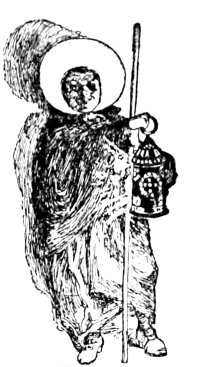
THE MAN IN THE MOON
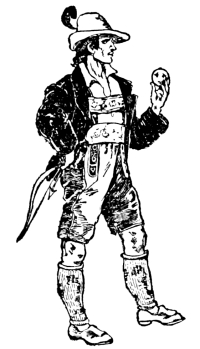
William Tell
Santa. No, no. You are never too early to please us. We like to see your shining face at any time.
Jack. William Tell of Switzerland.
William Tell. [Tyrolese costume, an apple in hand, bow and arrow under arm.] Good evening, everybody, what pleasant weather! Thirteen degrees below zero. It reminds me of our Alps at home. [Stands next to The Man in the Moon.]
Jennie. How is your son, Mr. Tell? Is he just as brave as ever? Do you ever shoot apples off his head nowadays?
William Tell. Thank you, Jennie. Little Billy is well and happy. He is always a fearless child. He is tending a herd of chamois on Mt. Blanc this winter. Yes, we often practise a little sharpshooting. [Pg 78]
Jack. [Aside.] Now that chamois herding is a job I’d like to hold down myself. [Aloud.] The Clerk of the Weather.
The Clerk of the Weather. [Carrying thermometer, weathercock, telescope, umbrella, weather bulletin.] Good evening, all. I am so glad to be here. I had a great time getting my work arranged so I could get off. I am afraid now [looking at bulletin] that there will be floods or blizzards or something. There are so many hitches in a business like mine. [Stands next to Tell.]
Jack. Robinson Crusoe and Friday.
[Robinson Crusoe and Friday are dressed in furs. Friday leads toy goat. Jack blows on Friday, who shivers.]
Robinson Crusoe. Good evening, Santa and Mother Goose. Allow me to present Friday. No, thank you, we will retain our furs. This weather is so different from the climate in the tropics, you know. [Crosses and stands by Mother Goose.]
The Clerk of the Weather. [Tartly.] Now, that’s just the way it goes. It isn’t warm enough for you, Robinson, and here’s William Tell who thinks it just right. It is hard to please everybody on weather. I get almost distracted at the complaints all over the planet. It keeps me changing things all the time. [Pg 79]
Jack. Mother Shipton.
Mother Shipton. [Very solemn and important.] Yes, here I am. I came in one of those carriages without horses that they call automobiles. Really they ought to be called Shiptonians in honor of me, for it was I who gave the idea of them to the world. We prophets are seldom believed, though, I suppose, we are lucky not to be stoned.
Jack. How about 1881, Mother Shipton? Why didn’t you hit that date a little closer for the world to come to an end?
Mother Shipton. [Stands next to Crusoe and Friday.] That was simply a misprint, young man. Just you wait long enough and you will see the world come to an end yet. Wait till 2881 and see what happens!
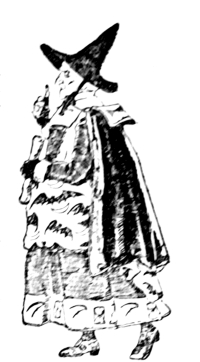
Mother Shipton
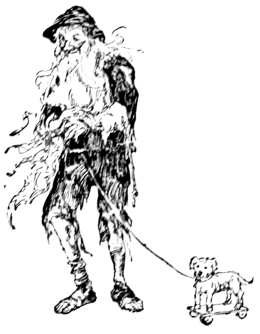
Rip Van Winkle
Jack. Rip Van Winkle and Schneider.
Rip Van Winkle. [Leading toy dog.] [Pg 80] Goot efening, good efening. So I bring mein little dog Schneider. I am so lonesome already ven I don’t have along the schmall dog, ain’t it? Mein frau like not Schneider never in the house. Have you some objectifications mit him, Mother Goo-ze? [Stands by Mother Shipton.]
Mother Goose. Not at all, Rip. He seems a very pleasant dog. You must always bring him with you.
Jack. [Aside.] I say, I’d like a game of ninepins on the ice with Rip. [Aloud.] Dick Whittington and the cat.
Jennie. Oh, Mr. Whittington, good evening. I am so glad to see you and the cat. I have so often heard of this wise old pussy of yours.
Dick Whittington. Oh, you don’t see me anywhere without that little mascot of mine. Here, Tabby, don’t be afraid of Schneider. Schneider is a good little dog. [Dog chases cat.]
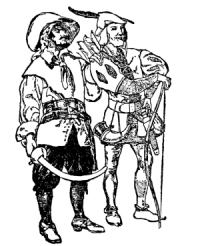
Captain Kidd and
Robin Hood
Jack. Captain Kidd and Robin Hood.
Captain Kidd. [Dressed as a pirate with cutlass, earrings, etc.] Here we all meet again on this pleasant occasion. It is seldom we old rovers have this home feeling anywhere on the globe. We go [Pg 81] cruising around all the time visiting scenes of old. But you know, Mother Goose, we always make a point of coming to the Auld Lang Syne Club to meet with you, even if we have to come from Cape Horn or Cape of Good Hope.
Robin Hood. [In hunter’s green.] Yes, yes, Santa, we look forward all the year to this quiet evening with you. I am happier here than I am anywhere except with my merry men in Sherwood Forest. The Auld Lang Syne meeting is worth a trip across the planet. [Kidd goes R. Robin goes L.]
Jack. Dame Rumor.
Dame Rumor. [Spectacles and ear trumpet, enters talking very fast.] I am sorry to be so late, but I met so many people on the way and there were so many things to tell and to hear that I thought I never should get here. They say—[Goes whispering to Mother Shipton.]
Jack. Pocahontas and Lo, the Poor Indian.
Pocahontas. [Dressed, as is Lo, in Indian costume, beads, feathers, etc.] Lo and I stopped to see the Falls of Minnehaha and that has made us late, I am afraid. We always linger at that lovely place.
Mother Goose. No, no, Pocahontas. You are in good time. You must stay all the longer for being a little tardy. [Pg 82]
Dame Rumor. Santa, why are you not laughing and joking as usual? I never saw you so downcast.
Mother Goose. Really, Dame Rumor, Santa Claus is feeling quite sad this evening. He will tell you all about what is weighing on his spirits, and I hope the wisdom of this good company will help him to look at matters more cheerfully.
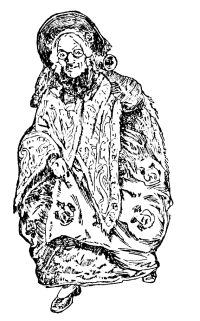
Dame Rumor
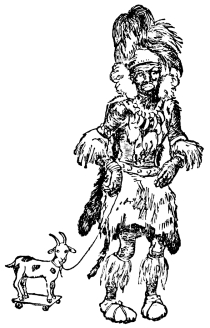
Man Friday
Santa Claus. Yes, friends, I am sorry to appear so sad on an occasion that ought to be so happy—an occasion when we old friends meet after a long separation.
Rip Van Winkle. Yes, yes, I haf never so much joyness any more as in this house, Santa. Here only is the beoples that can remember mit me the happy times long ago.
Dame Rumor. They say you used to be grumbled at a good deal in those happy days, Rip. [Pg 83]
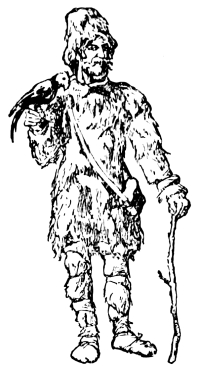
Robinson Crusoe
Jennie. Oh, now, Dame Rumor, let bygones be bygones. Please all listen to what Santa Claus has to tell. I want very much to see what the Auld Lang Syne Club will advise him to do. Go on, dear Santa.
Santa Claus. Well, my friends, I thought I would try the experiment this year of running a wireless line from the North Pole to most of the school yards in the country in order to hear the children telling what they would like to have for Christmas.
Dame Rumor. Dear me, I’d like to have a wireless line connecting with every home in the country! It was a fine idea, Santa.
Robinson Crusoe. I wish we had had one down on the island, Friday.
Santa Claus. Well, I have just got the connections made, and to-day I went to the Pole to spend the forenoon taking notes from school grounds in various parts of the country. And, to my utter astonishment, I heard children in each section of the nation all saying they did not believe in Santa Claus!
All. [Laughing.] Not believe in Santa Claus! How ridiculous! [Pg 84]
Dame Rumor. Oh, Santa Claus, you don’t take that seriously, do you? Why, I have heard that gossip for years, and I have also heard people saying that they did not believe the story of George Washington chopping down the cherry-tree. And yet I used to know a lady who knew a lady whose cousin’s brother-in-law had a piece of cherry-pie made from cherries that grew on that tree before George ever had the hatchet,—yes, indeed!
William Tell. Santa, we are all in the same boat. Don’t let such remarks trouble your mind. It’s the fate of every popular character to be disbelieved. People have gone so far as to discredit me and the story of the shooting of the apple off little William’s head. Think of that!
Dame Rumor. Yes, William, I have heard that apple shooting contradicted, too, and wasn’t that charming song, “In the Shade of the Old Apple Tree,” written in honor of a tree that sprang from some of those seeds that you shot out of the apple on little William’s head that day?
Pocahontas. Santa, you must not let such gibes hurt your feelings. My own existence has been denied over and over, notwithstanding John Smith’s testimony. One must simply live such things down.
Lo, the Poor Indian. [Solemnly.] Pocahontas is right, Santa. Don’t you know there is a theory among [Pg 85] critics that I exist only in the pages of Cooper’s Indian stories? Think of just being shut up in a book all the time!
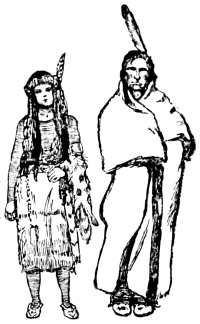
Pocahontas and
Lo! the poor Indian
Jack. Wouldn’t that make you gloomy?
Robinson Crusoe. I can understand how Lo feels. For it is now claimed by critics that a certain Alexander Selkirk instead of myself was the hero of my adventures. Think of having the ground taken from under your feet like that! Here is Friday and here is the goat, and yet they say there is no Robinson Crusoe!
Friday. If Robinson Crusoe didn’t discover me then I am not discovered yet, and I never made those tracks.
Rip Van Winkle. Just alike mit me come all dese peoples. Some beople say now I haf not hat that nap already, and we haf not seen that game of ninepins in dose Kaatskils, ain’t it, Schneider.
Captain Kidd. Haven’t I been ruled out of existence, too. But wait till they find my buried treasure, some day! [Pg 86] that those piles of Then they will know gold were never hidden without hands. Oh, my name was Captain Kidd, as I sailed.... Ha ha!
Robin Hood. Well, Santa, they have long had me down as a fabulous character myself, and I suppose I’m out of it. But then just think what they say of the great King Arthur! I understand that King Arthur and all the Knights of the Round Table are now considered merely as a romance, if you please. So you see we are all in good company, my friends.
Dick Whittington. Yes, I also belong to the large class of the unbelieved-in. But Tabby and I are not concerned about what others think. We just deserve to have friends, and then it’s up to the people to love us. Don’t you see?
Jennie. Well, if anybody has ever earned love it is our faithful old Santa Claus.
All. Yes, indeed it is. Everybody that knows him loves Santa Claus.
The Man in the Moon. Santa, when you have been laughed out of existence as often as I have, you can well complain. Why, I have been called everything from a piece of green cheese to an extinct volcano! But you never see me moping over it. I just keep a shining face, clouds or no clouds. [Pg 87]
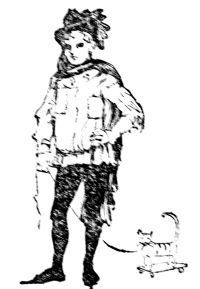
Dick Whittington
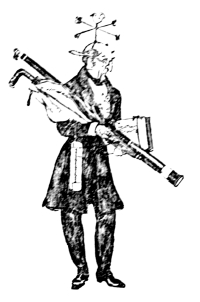
The Clerk of
The Weather
The Clerk of the Weather. Yes, I will vouch for that. The Man in the Moon is always beamy. And, Santa, just note how I send the rain on the just and unjust alike, although they all say there is no such person as I, and call the weather itself just a me-teor-o-log-i-cal phe-nom-e-non. No, Santa, do not mind a few chance remarks. Those children will know more by and by.
Dame Rumor. Santa, there are still hundreds and thousands who do believe in you; for I have heard children all over the world, talking of your loving-kindness. I myself always take pains to tell what you have brought to this one and that one.
Santa Claus. Dear friends, I have noted what you say and it really cheers me very much to find that I am not alone in being disbelieved in.
Mother Goose. Then you will forgive the children whom you overheard, Santa, and you will not desert the faithful ones who have always loved you? [Pg 88]
Jennie. And you will not think of that sorrow again, and you will go down with the reindeer as usual and take those ten thousand dolls to the ten thousand good little girls?
Jack. Oh, forget it, Santa, and take down those horns and drums for the boys on that waiting list. Think of the fun those kiddies will have!
All. Oh, yes, Santa, the world cannot spare you. We love you, and the children love you.
Santa Claus. [Smiling at Mother Goose and the rest.] Your words give me new courage. Yes, I will go on as if nothing had happened. I will never desert the dear children. They shall have their Christmas gifts as long as there is a Santa Claus.
Curtain [and distribution of gifts].
[Pg 89]
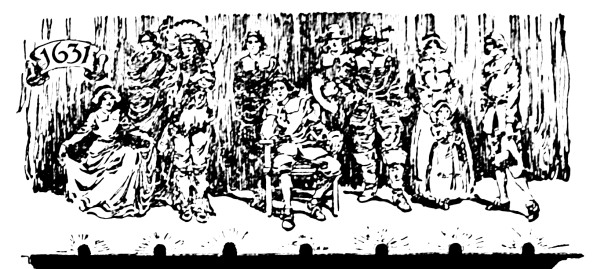
A One Act Play for Schools
By Agnes Miller
In order to make this play practicable for general use, the scenery and stage-directions suggested have been made as simple as possible. Regarding costumes, it may be said the play can be effectively produced when the children wear ordinary clothes, the Puritan costume being suggested by white caps and deep collars and cuffs for the women characters, and broad-brimmed hats and wide collars for the men. These accessories can be easily made of very inexpensive material, and copied from any of the well-known Puritan pictures. The Indians may either appear in the Indian costumes possessed by so many boys, or, in case these are unavailable, they may be draped in gay blankets and wear feather head-bands, which may be easily imitated.
CAST
| John Winthrop, | Governor of the Massachusetts Bay Colony. | |
| William Pierce, | Captain of the ship Lyon. | |
| Thomas Dudley, | Deputy-Governor of the colony. | |
| John Wilson, | Colonists. | |
| Roger Clap, | ||
| Mrs. Freeman, | ||
| Mrs. Garrett, | ||
| Patience Freeman, | aged 8, daughter to Mrs. Freeman. | |
| Samuel Garrett, | aged 10, son to Mrs. Garrett. | |
| Chief of the Narragansett Indians. | ||
| Young Narragansett brave. | ||
| Man-servant to Governor Winthrop. [Pg 90] | ||
SCENE
A room in Governor Winthrop’s house in the Massachusetts Bay Colony. The front door of the house opens at center back of stage, and has small windows on each side of it. A door on the left opens into the next room. The room is very plainly furnished, and is evidently used for transacting business. On the right of the front door is a settee, with a chest standing near it, and on the left of the door is a chair. Near the front of the stage, on the right, stands a flour barrel, and beside it, a table with weighing-scales. On the left side of the room there is a chair before a desk covered with papers, etc. Several portraits and old prints hang on the walls.
[A knock is heard on the front door. Enter Servant, at the left, who crosses to front door, and opens it, disclosing Mrs. Freeman and Patience. Mrs. Freeman has a basket on her arm.]
Mrs. Freeman. Is the Governor at home?
Servant. Yes, madam; he has just come in.
Mrs. Freeman. Will you let him know that I am here?
Servant. Directly, madam. Please be seated. [Motions them[Pg 91] to settee, and exit, left; Mrs. Freeman and Patience sit down on the settee. Patience breathes on her hands, to warm them.]
Patience. [Fretfully.] Mother, do you really think the Governor will give us some more corn? I’m so tired of having nothing good to eat!
Mrs. Freeman. Why, Patience, of course he will if he can spare us any; but you must remember how many sick people there are in the colony, who need it more than we do.
Patience. Yes, Mother, but why can there not be enough for everybody?
Mrs. Freeman. I hope that there may be before long, my dear. We must try to think that our ship with provisions is coming in soon. ’Sh-h! I hear the Governor coming! Now remember your manners! Rise and curtsey as I have taught you.
[Winthrop enters at left; bows to Mrs. Freeman. She and Patience curtsey.]
Winthrop. Good day, Mistress Freeman. I trust that you and all your family are well.
Mrs. Freeman. All well, Your Excellency, and thankful to be so in this season of want and cold. All that we could complain of is that our larder is getting low, so I came to see if I could buy a few pounds of corn.
Winthrop. [Evidently worried, but trying to conceal the[Pg 92] fact.] Why, Mistress Freeman, it is about just that matter that I am awaiting tidings. This morning I sent word to the chief of the Narragansetts that we should like to trade with him for corn. I expect that Master Dudley and Master Wilson, who took the message, will be back soon. Can you not wait till their return? If our trade is good, we shall doubtless have plenty of food for all.
[Mrs. Freeman and Patience sit down on settee. Winthrop sits on chair at left.]
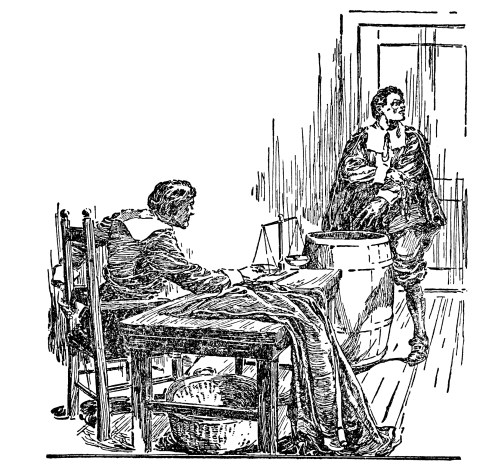
[Pg 93] Mrs. Freeman. I suppose Your Excellency has, as yet, no word of the good ship Lyon?
Winthrop. Not yet. No doubt the date of her sailing was deferred.
Mrs. Freeman. It would seem so, for Captain Pierce sailed last August to fetch us provisions, and here it is now February.
Winthrop. If we were all in health, the delay would not matter so much. But when half our people are too sick to leave their beds, we long to give them some of the comforts they left in England.
[Knock on front door. Servant enters at left, and opens door. Enter Mrs. Garrett, who curtseys to the company. Exit Servant.]
Ah! Mistress Garrett! I was lamenting to Mistress Freeman that we had few English comforts for our sick, but I did not forget that we brought the best nurse in England with us!
Mrs. Garrett. Your Excellency is very kind. I could only wish that I might do more in all the homes where sickness has entered. I thought, however, that you might like to hear that Master Humphrey and his wife are much better of their fever. [Sits at center.]
Winthrop. I rejoice to hear such good news, and I trust that you can give as good an account of your other patients. [Pg 94]
Mrs. Garrett. I would that I could, Your Excellency, but what with this biting cold and our poor victuals, it goes hard with them. Is there still no hope of the Lyon?
Winthrop. No immediate hope, madam, but I am expecting that we may be able to buy corn from the Narragansetts.
[Knock on the front door. Enter Servant at left, opens door to admit Dudley, Wilson, the Narragansett chief, and the young brave. Dudley and Wilson greet the company, and, with the Indians, come forward to right center of stage. Servant stands in background, at left of front door.]
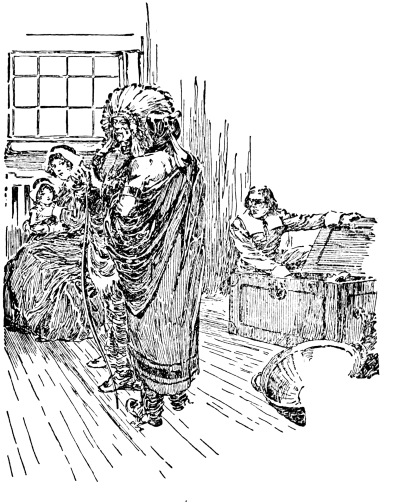
Dudley. [To Winthrop.] We have brought the chief back with us, Your Excellency, as you directed, but he does not seem favorable to making a trade. However, we can but try. [Dudley and Wilson then endeavor to conduct the trade, in dumb show, as follows: Dudley beckons the chief over to the flour barrel, and indicates to him by gesture that it is empty. He and Wilson then go to the chest, and take from it several long and showy strings of beads, which they offer to the chief, suggesting by their motions that the Indians may have the beads if they will fill the barrel. The chief shakes his head. Both men urge him in vain for some time. Winthrop then takes a red blanket from the chest, approaches the chief, and offers it in [Pg 95] similar fashion. Finally, after all three men have persisted in their offers for some time, both the chief and the young brave shake their heads decidedly, and by pointing to their own mouths and showing [Pg 96] their empty hands, indicate that they themselves have not enough to eat. Upon this Winthrop lays down the blanket upon the table, and Dudley and Wilson cease their offers, in apparent despair. The Indians then file stolidly out of the front door, which is opened for them by the Servant. Exit Servant.]
[A silence falls on the company. It is broken by Patience, who is frightened, and begins to cry.]
Patience. [Clinging to her mother’s hand.] Mother!
Mrs. Freeman. Yes, what is it, little daughter?
Patience. If we had only stayed in England, we should have had plenty to eat!
[Mrs. Freeman does not answer her, but puts her arm around her, and turns to Winthrop.]
Mrs. Freeman. Is it not hard sometimes, Your Excellency, for all of us to realize how much more precious liberty is than the comforts we gave in exchange for it?
Winthrop. You speak truly, Mistress Freeman. But we have crossed the sea in safety; we have been kept from harm among the savages; we have founded a colony where freedom is to be the birthright of every citizen. I believe that we have a right to expect to receive [Pg 97] our daily bread. Whatever happens, we must not give up hope. I will proclaim a day of prayer and fasting for to-morrow. We must not lose faith, for all may yet be well.
[Wilson, who has been standing by the table, crosses to the barrel and glances into it.]
Wilson. See, there is still some corn in the bottom of our last barrel. May not this be a sign that we shall be fed until help comes, even as we read in the Scriptures that the widow’s handful of meal lasted till the famine was past? [As the company nod approval to his words, there is a knock on the front door. Servant enters at left, and opens door to admit Roger Clap. Clap is wild-eyed and shivering, and looks distractedly about until he sees Winthrop. Servant stands at left of door.]
Clap. [Impetuously crossing stage to Winthrop.] Your Excellency, my wife is dying, and my children have been without food for two days. Can you give me nothing for them?
[Winthrop goes to barrel, and scoops out a small portion of meal.]
Winthrop. [Sadly.] This is the last of our corn. [Looks at Mrs. Freeman.]
Mrs. Freeman. [Promptly.] Let Clap have it, by all means. What say you, neighbors?
All. Yes, let him have it, to be sure! [Pg 98]
[Winthrop puts meal in a dish, which he is about to hand to Clap, when there is a knock on the door. It opens before the Servant can reach it, and Samuel Garrett rushes in.]
Samuel. [To Winthrop, breathlessly.] Your Excellency, the Lyon has come! [The company are startled and surprised, and scarcely believe him.]
Winthrop. Boy, is this the truth? How do you know?
Samuel. Indeed, Your Excellency, it is nothing but the truth! I was down on the shore, when I looked across the bay, and saw a great ship entering the harbor. And as I ran up to bring you word, I heard a man saying that Captain Pierce was even now being rowed ashore.
[Before any one can speak, there is a loud knock on the door, and as the Servant hastily opens it, Captain Pierce appears on the threshold. Winthrop rushes to meet him, and seizes him by both hands.]
Winthrop. Never was man, or ship, more welcome! William Pierce! Thank Heaven!
[The others crowd around Pierce, and greet him with joyous and grateful exclamations.]
Pierce. [To Winthrop.] Your Excellency, I have the honor to report the safe arrival of the Lyon! [Pg 99]
Winthrop. An hour ago we had well-nigh given you up!
Pierce. We have met with many unforeseen delays on our voyage.
Wilson. Did you meet with storms?
Pierce. Many of them, one so severe that one of our sailors was washed overboard. But our greatest delay was caused by our meeting a dismasted bark, which we must needs tow back to Bristol. We could only imagine what you must suffer in our absence. I, too, thank Heaven we have arrived!
Dudley. Have you provisions aboard?
Pierce. Yes, verily, a goodly store. We have wheat, peas, and oatmeal; we have beef and pork and cheese and butter! [Great relief and thankfulness shown by the company.]
[To Winthrop.] If Your Excellency will ask a few men to volunteer to go down to the Lyon and help us unlade her, we shall have everybody fed within the hour.
Samuel. [Eagerly.] I will volunteer!
[All laugh. Pierce pats him on the shoulder.]
Pierce. You shall come down to the ship with me. There is plenty for smart lads to do as well as men. [Pg 100]
Winthrop. Friends, I will now proclaim not a day of fasting and prayer, but one of praise and thanksgiving for our deliverance. However great the destiny that may await our colony, struggling here in the wilderness, this day must never be forgotten!
[Curtain]
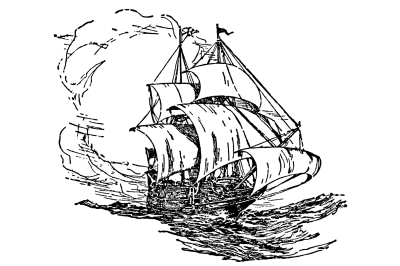
[Pg 101]
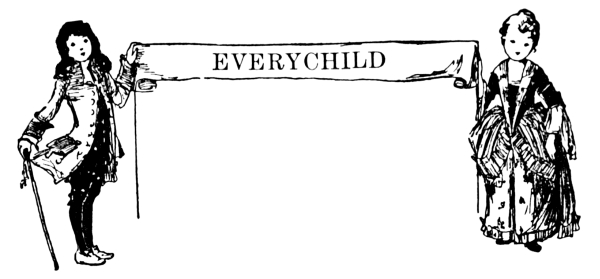
By Content S. Nichols
(A School Morality)
How Everychild sought for a companion on her quest for Goodness and Beauty, and having at length chosen, received also certain treasures.
CHARACTERS
No stage setting except a chair.
[Enter Everychild.]
[Enter, slowly, Idleness, in soft robes, with large fan and box of chocolates.]
[Gaiety runs and dances on, in light costume, with wings. She flies to and fro across the stage, while Everychild runs after her, crying, “Take me!” but is left behind. Gaiety slaps her and runs off.]
[Enter Latin, in dark gown, with blue veiling over hair and shoulders, carrying heavy volumes.]
[As Everychild puts her hand in Latin’s and advances a step, enter Mathematics, also in dark gown, with head covered, carrying slate or compasses.]
[As they begin to go off together, enter Discipline, in black gown and cap, with bunch of switches, arms folded, frowning.]
[She advances to take his hand. As he says the next lines, he throws down his switches, or, if a girl, throws off dark gown and veil, and draws forth a box of treasures. At the same time, Latin and Mathematics throw off their dark gowns and veils, and appear in light garments, with flowers, fillets, or wreaths on their heads. The Page may give Latin a wreath, Mathematics a lighted lantern, and gather up the gowns.]
[Enter Joy and Service, quickly, hand in hand; in bright floating dresses, with wings. Joy with wreath of flowers, a star on her head and a wand; Service with Greek fillet, scattering flowers.]
[They kiss, and circle in a little dance, which may end in a kiss.]
[Pg 111]
By Rachel Lyman Field
CHARACTERS
| Everygirl. | ||||
| Hope. | Wealth. | Knowledge. | Health. | Eight Dancers. |
| Mirth. | Beauty. | Work. | Love. | |
SCENE
Twilight in Everygirl’s garden.
DANCE OF THE FLOWERS
[The dancers wear white dresses trimmed with the flower which each represents.]
[After the dance is finished, enter Everygirl.]
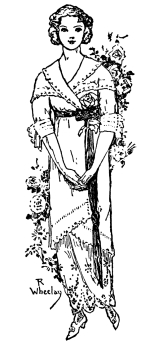
|
Hope. Dear Everygirl, these words you speak are true,
Hark! do you hear that far-off voice? Listen!
It is the World’s voice, Everygirl. It calls—
And you must follow, when the World calls.
I know the garden bids you stay,
And yet the World is stronger; you must go.
So, Everygirl, this night I come with cheer—
To say that you may choose three friends to go
Journeying with you hand in hand, to share
All joys and sorrows that the World may give.
Think well, and choose with care these three,
For they shall go with you forever.
|
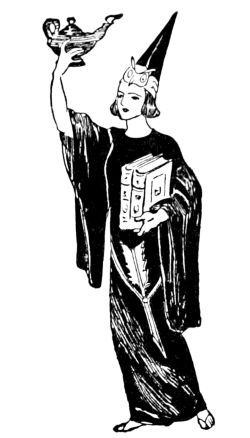
Knowledge
Black gown of sateen.
Black cap with brown owl’s head and wings.
Lamp made of gravy-boat, painted brown.
Large pen for sword.
[Enter Mirth, dancing and singing to the tune of “Funiculi, Funicula”.]
[Mirth stands silenced for a moment, then slowly exits.]
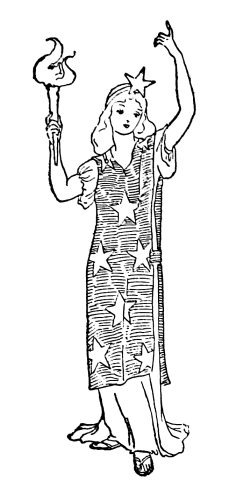
Hope
White cotton frock: pale blue tunic,
ornamented with white silk stars applied.
Pale blue fillet on head with silver star.
[Everygirl hesitates, takes one of the bags, but suddenly drops it, covering her face with her hands.]
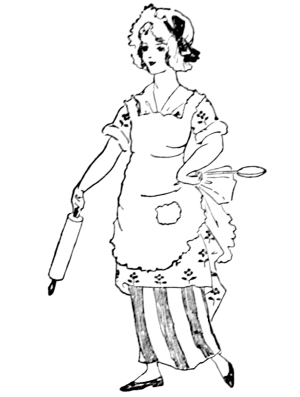
Work
White cotton frock flowered in china blue,
turned back over blue and white striped petticoat.
White apron and cap.
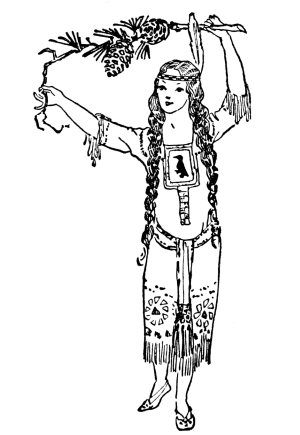
Health
Camp-Fire costume made a little more
elaborate by bead-embroidery and
stencilling. Branch of Pine.
[Enter Knowledge, clothed in black. Everygirl shrinks from her.]
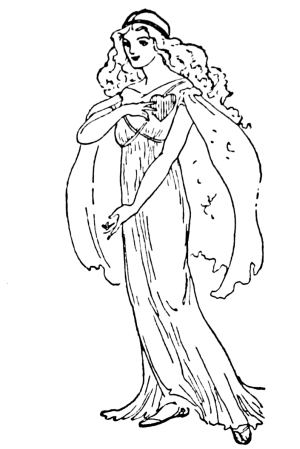
Love
Frock of thin white cotton or China silk:
angel sleeves shirred at shoulder:
gold paper heart on left side.
Gold fillet in hair.
[Knowledge turns sorrowfully away. Everygirl kneels, her face in her hands.]
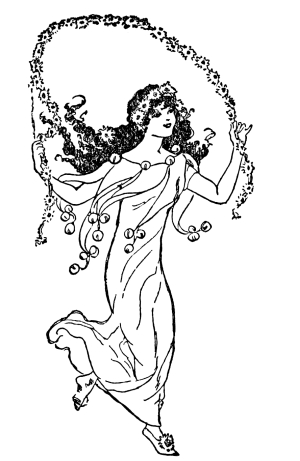
Mirth
White cotton frock: points of yellow
from neck, with gilded bells: wreath
of daisies, and skipping rope
wound with the same.
[Enter Work, Health, and Love at the back of the garden. Work, advancing, touches Everygirl upon the shoulder.]
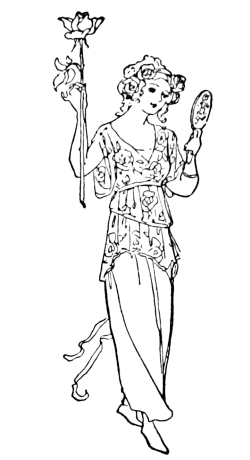
Beauty
Tunic of soft white silkaline
flowered in pink roses:
American Beauty rose made of wire
and tissue paper for scepter,
White skirt.
Tiara may be made
of cheap hat pins.
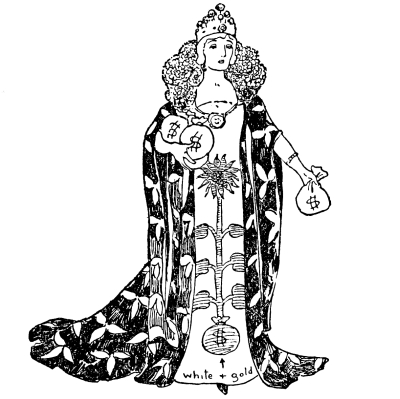
Wealth
A Princess gown of white, stencilled in gold:
robe of red also stencilled in gold:
collar made of wired net with wild
carrot blossoms sewed flat.
[Everygirl, with one hand held by Work and one by Health, and led by Love, leaves the garden. At the gate she turns and faces the audience.]
[A camp-fire girl in her Indian costume steps forward and recites the epilogue.]
[Curtain]
[Pg 122]
(A Shadow Play)
By Irene Woodbridge Clark
The following little play was written for a special occasion, and was successfully presented as a side show at a church fair. Tickets were sold at ten cents each, and the performance, which was repeated several times, netted forty-two dollars. The expense of getting up the play is very slight. The screen upon which the shadows are thrown may be formed of two or more large sheets, sewed firmly together, and stretched smoothly from ceiling to floor, or to the platform of an improvised stage. Several strong tables—kitchen tables, for instance—ranged in line behind the screen, and as near to it as possible, would make an excellent platform, for as the actors walk close to the curtain, a wider flooring is not necessary. At each side of the stage and screen a heavy shawl or blanket should be hung, so that the actors may be concealed from the audience when not engaged in the performance. There should be but one light to throw the shadows. A kerosene lamp is very effective, if placed with the narrow side of the flame toward the screen, the object being to concentrate the light, and cause it to come from as small and yet as brilliant a point as possible. Set the lamp in a box of some kind; a wooden soap box would do, with one side open toward the screen. The box should be painted a dull black inside, or old black cloth may be tacked in as a lining. If the inside of the box is not black, it will reflect the light, and cause the shadows to appear blurred. On no account use a reflector, as this would have the [Pg 123] same effect. An opening may be cut through the box, just above the lamp chimney, to allow the heat and smoke to escape. When it is necessary to shut off the light, as at the end of each scene, or at the close of the performance, this may be done by quickly sliding the cover of the box across the open front, and thus obscuring the lamp entirely. The box with the lamp should be about on a level with the actors’ feet, or a trifle higher, and should be at least five or six yards behind them, if possible to arrange it so.
All these arrangements are behind the screen. The audience is to be seated on the other side. It is not necessary to conceal the screen with a curtain, for if the light within the box is entirely cut off by placing the cover in front, and if the portion of the room in which the audience is seated is well lighted, no shadows from behind the screen will appear before the proper time. When the hour for the performance arrives, a decided stroke of a bell should be the signal for every light in the audience room to be turned out, and at the same moment, for the cover to be withdrawn from before the box containing the lamp. If this is well managed, Scene 1, having already been arranged against the screen, will instantly appear to the audience in sharp, black shadows. At a second quick stroke of the bell, the reader begins the play. Any one with a good clear voice may act as reader. The best place for him to sit is behind the screen near the lamp. As he reads only during the actual performance, he needs no other light, but he should be careful that he does not place himself in such a position that his own shadow is thrown on the screen. The cat and pedestal stand five feet, eight inches in height. A few other measurements are given in connection with Figure No. 1, and with these as a guide, the outline of the cat and pedestal may be drawn of the proper size on a large sheet of brown paper and then cut out and taken to a carpenter who will saw the figure out of heavy board. The cat, who has already appeared before the public, was cut out pedestal and all in one piece from a large smooth, pine board, an inch in thickness, the cost being seventy-five [Pg 124] cents. The pedestal was braced at the bottom so that the figure would stand upright alone, but care was taken that no projection was made on the side to be placed against the screen. A narrow strip of rough fur was tacked all around the outer edge of the cat, except around the feet, and this, with a fox tail, through which a strong piece of wire was run, gave her a very real appearance when seen in shadow. The boy or man, who managed her, sat on a stool behind the pedestal, and in addition to working the eyes, tail, mouth, etc., would meow mournfully, or spit fiercely, as the events of the play demanded. For further directions as to the making of the figure and the working of the parts, see explanation of diagrams. The lobster, spider, fishes, the maiden’s heart, and the immense dollar used by her in Scene 2, her slippers, curling tongs, and brushes, and even the tears she shed, were all cut from pasteboard. Comical hats for the actors were made by taking old shade hats and fastening ridiculous pasteboard shapes upon them. The mice and rats which run by the cat in Scene 1, were cut from pasteboard and were somewhat larger than life size. Four of them were tacked by the feet to a long narrow strip of wood at about a foot apart, and to one end of this board was fastened a small strong cord. When arranging for Scene 1, this strip of board was laid in place at one end of the stage, on the floor close to the screen, but the figures of the mice were turned over on their sides, so that their shadows would not appear. The cord which reached from the end of the board to the other end of the stage lay along the floor close to the screen. During the reading of verse third an assistant quickly turned up the board, so that the mice instantly appeared in shadow, and a second assistant drew it steadily by means of the cord across the stage between the cat and the screen, until it was out of sight. The fly which buzzes around the cat’s head in Scene 6 was also cut from pasteboard, and fastened to the end of a rather fine wire, which was manipulated by the person in charge of the cat. When not in use it was hung by a loop in the end of the wire, on a nail fastened in the figure of the cat. In Scene 4, the [Pg 125] castle might be represented by a clothes-horse, covered by a heavy shawl, or by a large screen placed flatly against the curtain. A window is not an absolute necessity, as the heads of the maiden and her suitors might appear over the top of the castle wall. To raise these actors to the proper height a table or a number of strong wooden boxes may be used to stand on. The ladder was a stepladder of a medium size. It was kept hidden behind the castle wall until the lover pulled it out. When he had arranged it in place, the maiden stepped from her elevated position to the ladder, and thus descended. The cat which appears in Scene 4, is a second one, cut from very stiff pasteboard and braced in places with strips of wood. Two screw eyes are fastened into the wood, at A and B, as seen in the diagram of the leaping cat. Just before Scene 4, a strong slender cord is fastened to a nail driven in the floor at the end of the stage farthest from the castle. This cord is then passed through the two screw eyes in the cat, and the cat is given into the care of one of the actors—one of the rivals, who stands [Pg 126] behind the castle wall. He holds the cat in his left hand and the end of the cord in his right, but allows the length of the cord to hang loosely to the floor until the time for action. At the beginning of the verse, “She fought until they both had fled,” he suddenly holds up his arm, twists the cord about his hand and draws it tightly, and at the words, “Leaping from the window sill,” with a quick motion lets the cat go, when it rushes swiftly down the cord close to the screen, and is caught by an attendant at the farther end, who himself remains concealed. This cat is not nearly so large as the other, not being over a yard in length. The lobster is about two feet in length. To the upper part is fastened a strong linen thread, which passes through a screw-eye in the ceiling above the stage or through a brass ring sewed to the top of the screen. The other end of the thread is held by some one at the side of the scene. The lobster may hang below the stage platform, between it and the curtain, or may lie on the stage floor until needed. When its turn comes to appear, the attendant draws the thread and pulls it up into sight where it hangs flatly against the screen. The spider is hung in the same manner and is held in place at the top of the screen until time to drop upon the maiden’s head. A pasteboard spider is better than a heavier one, as it responds more quickly to the little pulls and jerks given to it and thus appears to have more life. The maiden’s pasteboard heart is about six inches long. By keeping the hand which holds it within the shadow of her figure she may throw it from her open mouth apparently, without the action of her hand and arm being seen. The effect may scarcely be called natural—who [Pg 127] could expect it would be? But it never fails to produce a roar of laughter. Picking up the heart again, the maiden opens her mouth and appears to swallow it once more. After which she regains her composure, which has been sadly disturbed. Sawdust poured from a pitcher appears as a fine substitute for cream and can be used again and again. In Scene 3 the cat seizes the rivals by the fingers. This effect is produced by the rivals, one on either side of the cat, placing each a forefinger in a corner of the cat’s mouth, and holding it there while apparently trying to pull it away. If the rivals thus caught jump and dance with pain, the effect is increased. The serving maid who brings the tea in Scene 5 wears a cap and apron and carries a tray bearing a number of unbreakable wooden and tin dishes which make a great clatter in falling without causing any damage. The tea table, a small one, supported by a single post in the center, may be cut from brown paper and pinned on the screen before Scene 5 appears. In shadow it will seem to be just as real as an actual table, but of course a real table may be used if preferred. Several dozen curl papers, like lamp lighter quills, may be sewed to a circular piece of muslin which is tied on top of the rival’s head for Scene 5, and covered by his tall head dress. When this head dress is suddenly removed, the quills stand out in all directions.
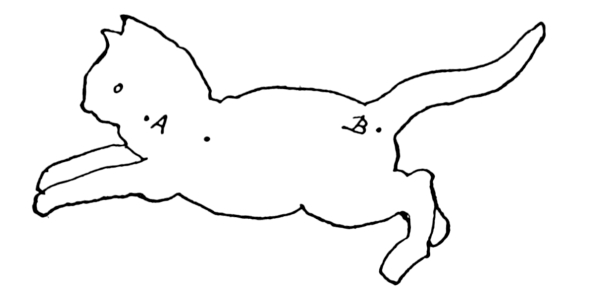
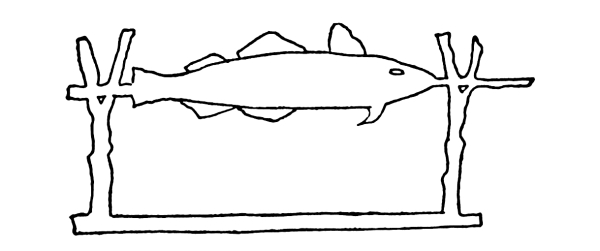
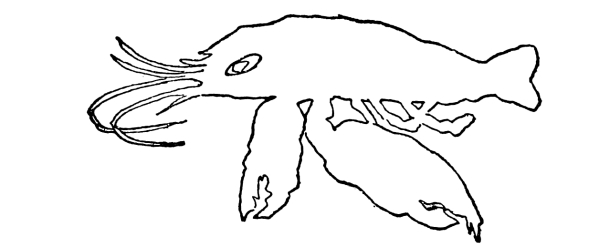
A word to the actors. Let them keep so near to the screen in all their acting that they actually touch it, and let their profiles be constantly toward the spectators. The words of the play should be familiar to each performer, that he or she may know what is coming next, and be prepared to act on time. Many comical things will suggest themselves to those taking part, if the play is entered into with spirit.
EXPLANATION OF DIAGRAMS
The figure of the Cat having been sawed out of wood, it is ready to be equipped with the other parts. Nearly one yard of cotton elastic, a half or three quarters of an inch wide, will be needed. Also several [Pg 128] screw eyes of medium size; a staple to fasten the tail; a firm piece of wire which will not easily bend, about 18 inches long; a fox tail; 2¾ yards of any kind of rough fur, old or new; a spool of linen thread No. 25; a yard or two of strong, fine twine; a few strips of thin board, of a kind that will not be easily split, and several pieces of thick, strong pasteboard.
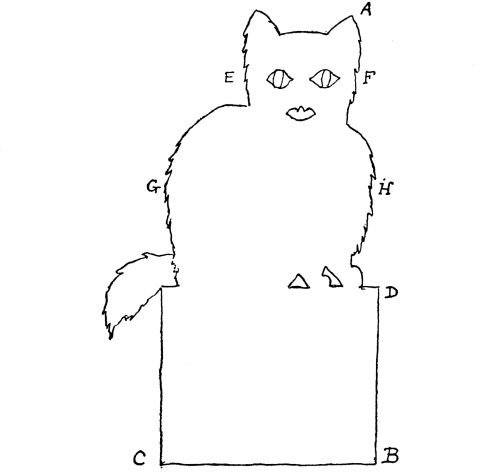
Fig. 1.
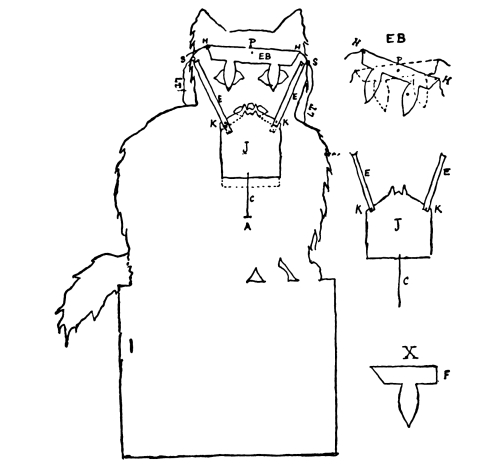
Fig. 2.
To make the eyeballs. Fold a piece of brown paper, and cut out in what you judge the proper size, a copy of the small diagram marked X, which is shown in Fig. 2, taking care that the fold of the paper is at F. When the pattern is opened it will be found to be like the small [Pg 129] diagram, EB. Pin this pattern in place on the wooden cat in the manner shown in Fig. 2. If not of the proper size make another. When you have a pattern that seems to be correct, lay it on the pasteboard and outline it with a pencil. The resulting figure may then be cut out with a sharp pocket knife. In the small holes made at each upper corner of the cross-piece, H and H, fasten a piece of linen thread, about one half a yard long. When the eyeballs are in place, these threads are to be passed through the screw eyes fastened at the side of the cat’s head at S and S, and brought around to the reverse side of cat’s head, where they are tied together at the ends, thus forming a loose loop. Fasten [Pg 130] the cross-piece in the center to a central point above cat’s eyes, by means of a screw-eye or ordinary screw, as indicated in diagram. This forms the pivot on which the eyeballs move, and as it is necessary that they move very easily, the cross-piece should not be fastened down too firmly. When the linen thread is pulled at the right or the left by the operator who sits on the reverse side, the eyeballs will move from side to side. The piece forming the jaw is cut from pasteboard in a similar way. Across the lower part tack a strip of wood. To the center of this strip fasten the end of the cord, C, which is used to pull the jaw down. Cut two pieces of elastic each 6 inches long, and fasten to jaw at K and K, having first tacked another strip of wood across. Lay the jaw in place over the cat’s mouth, in such a position that the teeth of the lower jaw will meet the teeth of the upper jaw. While holding the jaw in this position, tack the free ends of the elastic to the cat’s head as shown in diagram. This must be done without stretching the elastic. When the cat stands erect the jaw will now hang in place. Pass the cord, C, through the aperture A, which has been previously cut in the body of the cat. When it is desired to open the cat’s mouth, pull the cord down; the elastics will cause it to spring up in place again when the cord is not held. The aperture A should be cut through the wood with a downward slant; if cut straight, the light would show through the opening. Figure 3 shows diagram of eyelids. These are to be fastened on the other side of the cat, the side on which the operator sits. The figure, EL is cut from pasteboard and stiffened by a long narrow strip of wood, running crosswise through the central portion. A loop of cord is fastened at R and R. Two strips of elastic, each seven inches long, are fastened at Z and Z. The eyelid piece is then laid in place over the eyes, in such a position that the eye sockets are entirely covered. Then the other ends of the elastics are tacked to the cat’s head at V and V, or wherever the ends happen to lie when laid out smoothly, without stretching. Fasten a screw-eye or hook at H in cat’s body, and pulling down the loop of cord, hook it under the screw-eye as [Pg 131] shown in diagram, which will again leave the eye sockets exposed. When it is desired to have the cat wink, unhook the loop, and pull the eyelid piece up and down rapidly. When not using this contrivance, always keep the loop hooked under the screw-eye, else the cat’s eyes will appear to be closed. In regard to the tail—insert a stiff piece of wire about 18 inches long, leaving the end of wire exposed for about 8 inches. Where the wire enters the tail at F, fasten it to the cat by means of a staple but in such a way that it will move freely. To the free end of wire fasten a piece of elastic nine inches long. Tack the other end of this elastic to the cat’s body at E, as shown in Fig. 3. [Pg 132] Also fasten a piece of cord to the same end of wire, which may be used to pull down the tail. It will spring up voluntarily as the elastic draws it. The strip of fur is to be tacked all around the edge of cat’s body, except around the feet, which would not show well in shadow if surrounded by fur. When this is finished the cat is complete.
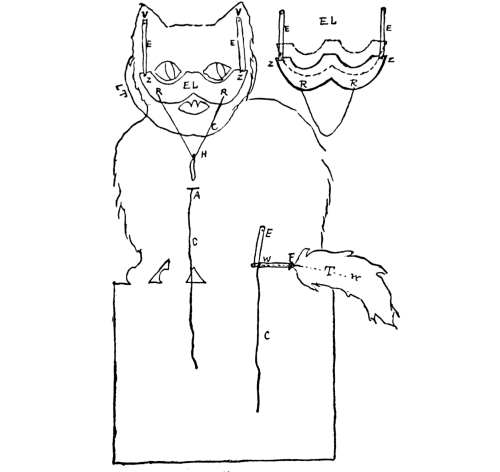
Fig. 3.
The operator should be quick but not nervous. To make the cat appear life-like, he should keep all the mechanism at work as much as possible, taking care to have her movements as much as possible in harmony with the play. If he practises a little before the performance, he can make the cat the center of interest. When the actors feed the cat the operator should slowly pull down the jaw, and when the food is received shut it again quickly. When the cat is supposed to speak the operator should make the action of the jaw keep time with the words as they are read. When any one approaches the cat, by moving the eyeballs the operator may make it appear that the cat is looking in that direction. A judicious amount of purring, growling, and hissing may add to the interest, but it should not be too frequent.
[Cat on pedestal appears at left of center. Maiden, Fisher, Man with Cod, etc., all stand ready to appear in proper order. The Mice and Lobster are in place.]
[Screen the Light] [Pg 134]
[The same. Maiden discovered seated on a stool, at right of Cat, as this would appear to the spectators. Under the stool a wooden or tin plate is placed in readiness, also a large circular piece of pasteboard with the words, “One Dollar,” cut around the edge. The Maiden carries the pasteboard heart, and a handful of pasteboard tears. The spider hangs motionless high above her head—out of sight, if possible.]
[Screen the Light]
[The same. The suitors appear in line. The Fortunate Lover stands first, the Maiden, whose hand he holds, just behind him. The other suitors, in fantastic dress, are in the rear. They enter at right of stage, as it would appear to spectators.]
[Screen the Light]
[Castle wall appears at extreme right of stage, as viewed by the spectators. Large, strong boxes are placed behind, on which the Maiden and two rivals are to stand, in order to look out of the window or over the wall. The stepladder, folded, is laid on the floor behind the castle wall. All the appliances for the leaping Cat are in readiness, also all the articles of the Maiden’s wardrobe. Rivals and Maiden stand in shadow behind the wall. When the light is thrown on the screen, the Lover is seen in center of stage, looking up at castle.]
[Screen the Light]
[Within the castle rivals appear seated, with a small table between them. The Haughty Rival wears his curl-papers covered by a tall hat. The Humble Knight carries a dagger. Serving Maid stands outside the screen with tray, ready to appear at proper time.]
[Screen the Light]
[Same as first. Cat appears at left of center.]
If the shadow play is not to be repeated, the last two lines may read as follows.
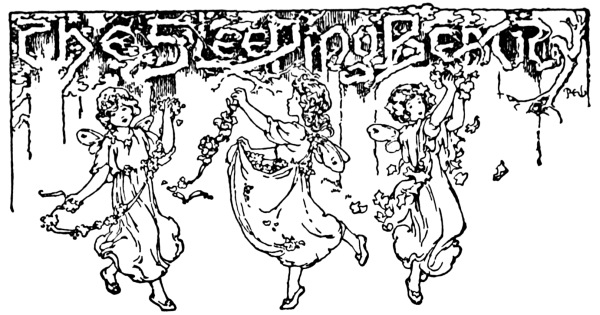
By Caroline Verhoeff
(For children between the ages of seven and eleven. All the parts may be taken by girls)
DIRECTIONS FOR STAGING
But one full set of scenery is required, a wood scene. If the play is presented in a large hall, the scenery may often be procured from a local theater, at little, or no, cost. If a drawing-room is used, a small wood scene, either mounted or unmounted, may be purchased from Samuel French, 28 West Thirty-eight Street, New York City. Where economy is desirable, the following home-made scenery will prove quite satisfactory: Background, stretch a rope from one eight-foot ladder to another. Hang sheets over the rope, and to the sheets fasten wall-paper representing a forest. If a good grade of wall-paper is selected, the effect is excellent. For the wings use two large-sized clothes-horses covered as the background, and placed to allow entrances to front and back. The backs of the clothes-horses are hung with white sheets, and in the garret scene they are simply turned to inclose the foreground of the stage, representing white walls. In the last act, a pretty transformation may be effected by means of a tarlatan curtain, green and hung with paper spring flowers, which is allowed to roll down and cover the background by the Spring Fairy. Or, if more convenient, strips of wall-paper with a design of flowers, birds, or butterflies may be used. [Pg 148]
PROPERTIES
Two chairs, preferably gilt, for the King and Queen. A couch for the sleeping Princess, and a robe to throw over her. This robe is made of brown cambric, covered on one side with cotton batting and sprinkled with “Christmas snow”; on the other with paper flowers and artificial moss. One or more bare trees or branches. These last are not absolutely necessary.
COSTUMES
These are made of cambric or sateen, in the brightest colors. For King, Queen, and Page copy the pictures in any good fairy-tale book. The Princess requires two costumes, a brown dress to represent the earth in the fall, and one of bright green, hung with spring flowers, to wear when she awakens in the spring. The Prince requires a suit of the brightest gold, with long, flowing sleeves and strings of tinsel hanging from his neck like rays of sunshine. The Fairies dress to represent their respective parts as spring, summer, autumn, and winter. Winter should be all in white, with silver tinsel.
CHARACTERS
There may be as many Lords and Ladies as the stage can accommodate. There must be three of each if the procession in Act II is to be effective, but if the stage is very small, the two children who take the parts of Prince and Princess in the last act may appear as a Lord and Lady in the second. Two Lords and two Ladies will be sufficient for the dance in the last act.
| King | ||
| Queen | ||
| Princess | ||
| Lords and Ladies | ||
| Page | ||
| Four Fairies | |
Spring |
| Summer | ||
| Autumn | ||
| Winter | ||
TIME
The play requires from a half-hour to an hour, according to the number of Lords and Ladies, and to the length of the dances.
[Pg 149]
SCENE
Act I—The depths of the woods; Act II—The palace garden; Act III—A garret; Act IV—Winter woods; Act V—The awakening in the palace garden.
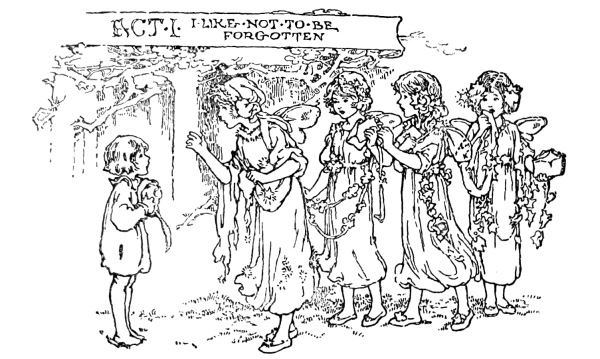
[Curtain rises on the three Fairies, Spring, Summer, and Autumn, dancing in the woods. After dance is finished, enter the King’s Page with three letters, one of which he hands to each Fairy with a courtly bow.]
Page. A message from the court, to please Your Fairyships.
Fairies. [Tear open the envelope and read.] The King and Queen do now request that you, as God-mama, will attend the [Pg 150] christening of the Royal Princess Erda, in the palace garden, to-morrow evening, e’er the sun shall sink to rest.
Spring. Well, Sisters mine, shall we accept the invitation?
Summer. It will give us pleasure, will it not, to serve so good a King and Queen?
Autumn. Indeed, we shall be glad to serve the court. Besides, of all the world, we love a baby best.
[Winter enters from the back, and remains in background, unseen by rest. She is plainly in a rage.]
Spring. Come, then, let’s write our answer to Their Majesties, and we must consider well our gifts.
[As they turn, they see Fairy Winter, and step to right of center.]
Winter. [Coming forward, to Page.] How, now, did Their Majesties send me no invitation?
Page. [Shivering as though cold.] No, Madam, not by me.
Winter. Then they will regret it.
[Three Fairies come forward anxiously.]
Spring. [Pleadingly.] Oh, Cousin, you will not cause[Pg 151] any trouble. Surely the King and Queen did but forget. They have so much upon their minds at present.
Winter. [Violently enraged.] I like not to be forgotten. Their Majesties must be taught a lesson. Ne’er shall they forget that they’ve forgotten me.
Summer. I know they did not mean an insult. Do, I beg, forgive the seeming injury.
Winter. No, not I. ’Tis not the first time the court has slighted me; but I can promise this, ’twill be the last.
Three Fairies. [In chorus, shaking heads sadly.] Oh, dear! Oh, deary me!
Spring. But always, Cousin, you have shown yourself so disagreeable at court; perhaps they fear you now.
Winter. And well they may. They’ll have good cause for fear. [Exit.]
Autumn. How cross she is! She’ll cause serious trouble, too, I know.
Spring. Let us then keep watch of her. Be ready to undo the harm. Come, to send our answers to the court.
[As they dance off, Curtain falls.] [Pg 152]
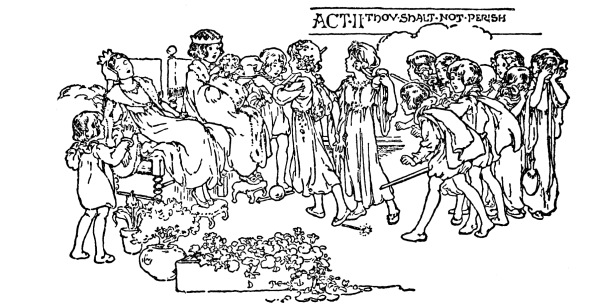
[Palace garden. Two chairs to the left. Trumpet-call. Music. Enter from left and back, Page, Lords, and Ladies, one carrying the baby Princess—a large doll. Procession to right; stand in semi-circle facing the chairs. Pause. Enter King and Queen, who walk in front of Lords and Ladies, and take their places in front of chairs. They bow in return to the bows and courtesies of the court. King and Queen sit down. Lady places Baby in Queen’s arms. Music ceases.]
Queen. Of all the babies ever born, this is the sweetest.
Lords and Ladies. [To one another.] The sweetest baby ever born.
First Lady. Such soft and silken hair. [Pg 153]
Second Lady. A rosebud for a mouth.
Third Lady. Her dimpled hands are soft as satin.
Fourth Lady. Her eyes a heavenly blue.
King. [Rising.] Come, my Lords, pledge allegiance to Her Royal Highness.
Lords. Sire, with right good will.
[Music. Each Lord in turn kneels before the Baby with his sword drawn, kisses her hand, and returns to his place, walking backward. As last does so, the music changes to a waltz movement, and first three Fairies dance in. They courtesy to the King and Queen.]
King and Queen. Fairies, you are welcome.
Fairies. Your Majesties, we thank you.
Autumn. [Stepping forward.] Graciously permit us to bestow upon the baby the gifts which we have brought. [Touches Baby with wand.] With beauty I endow thee. Beauty not alone of face and form, but loveliness of soul I give thee, so thou shalt be beloved of all the world. [Steps back.]
Summer. Wisdom is my gift, O Little One; men shall not love thee merely, they shall seek thee out that they may learn the wondrous secrets hidden in thy heart. [Steps back.] [Pg 154]
[Dreary strain of music. Winter enters unnoticed, and remains in background, close to entrance, until Spring begins to speak, when she moves a little forward and to the right.]
Spring. And I—but who comes?
[Winter moves slowly forward, but keeps to the right. Every one except Fairies shiver with cold. Baby cries out. Two Lords attempt to bar her entrance with crossed swords.]
Winter. [Contemptuously.] Do you think to prevent me with your swords? My Lords, I am a fairy.
King. [To Lord who stands close to him.] Who is this?
Lord. [Very earnestly.] ’Tis the Fairy Winter, Your Majesty. Send her quickly hence. Where’er she goes, she causes darkness, gloom. The flowers fade at her approach. Birds fly away in terror to escape her. Wild beasts seek their holes. Bid her be gone, I beg you, for her coming bodeth ill.
King. That I cannot do upon this day of days. Madam, I know you not, yet, for the Princess’s sake, I bid you welcome.
Winter. You know me not? That is passing strange. But Your[Pg 155] Majesty shall know me. I was not bidden to the christening feast as were these, my cousins—
Queen. The slight was unintentional. I do assure you, Madam.
Winter. Yet I came, and I also brought a gift.
[Touches Baby with wand; other Fairies look on anxiously.]
Winter. Thou, Princess Erda, wilt grow up beautiful and wise according to my cousins’ wishes. But when thou art become a lovely maiden, thou shalt [slowly] one day thrust into thy hand a needle, and [very slowly and very impressively] THOU SHALT SURELY—
[Great excitement. Queen hands Baby to King, and faints in her chair. Ladies tremble. Lords draw swords, and step forward threateningly. Spring jumps forward and interrupts Winter just in time.]
Spring. STOP! ’Tis fortunate, indeed, I had not time to speak before you came, my cousin. Little Princess [touches her with wand], it must be, alas, even as my cousin said. Thou wilt, indeed, thrust a needle into thy hand, BUT THOU SHALT NOT PERISH. [Relief on every face; Queen opens eyes.] Thou shalt only sleep awhile. [Soft music.] And I do here decree that while thou sleepest, thou shalt lovelier grow. And thou shalt dream of [Pg 156] him, the Shining Prince, until he comes to rescue thee, to waken with his kiss.
Winter. And so I am frustrated! Yet I do not greatly care. It were a pity to lose so fair a child. Perhaps the long sleep will be sufficient punishment, and teach this court ’tis never safe to slight a fairy. [Exit.]
Queen. [Quite recovered, rising.] Thank you, Fairy, for your timely aid. But oh, alas! my daughter needs must sleep—for who knows how long? [Takes Baby from King.]
King. I do hereby command that every needle be destroyed throughout my broad domain. Page [Page stands before him], send forth heralds to proclaim my will. [Page bows and goes off.] Be comforted, my Queen, how can our daughter prick her finger?
Lords and Ladies. [Happily.] That is true, how can she, when all needles are destroyed?
King. And now, good Fairies, my Lords and Ladies, let’s hasten to the feast; forget the evil prophecy, and make merry all.
[Procession off stage. King and Queen, Fairies, Lords and Ladies.]
[Curtain] [Pg 157]
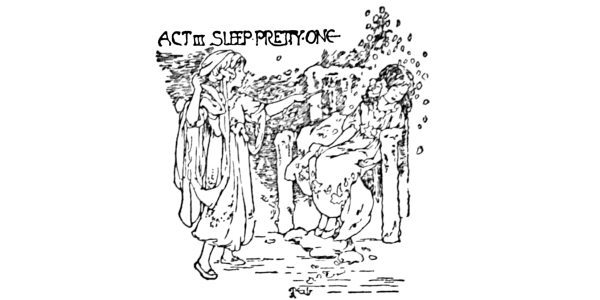
[A garret. Winter disguised as old woman by means of long, dark cape. Sits sewing on a square of tarlatan, on which has been pasted cotton to represent a house covered with snow. Enter Princess, quite out of breath. She is dressed in brown, decorated with autumn leaves to represent the earth in the fall. She wears one large, red rose, which is almost ready to fall to pieces.]
Princess. [Shivering.] Ugh! it’s cold and dismal up here. Why, good day, Granny.
Winter. [In voice of old woman.] Good day, Princess.
Princess. [Clapping her hands.] Do you know, Granny, I’m having such fun. I have run away, and the whole court is searching for me. I wanted to see what was hidden up here. What are you doing, [Pg 158] Granny? What is that tiny sharp thing in your hand?
Winter. ’Tis a needle, child. See, I put it in [slowly] and draw it out, so. It leaves a pretty picture on the cloth. [Holds it up.]
Princess. [Delightedly.] How very interesting! Good Granny, do give me leave to try.
Winter. [Rising.] Certainly, my child, sit here. [Princess seats herself in the chair and takes the sewing.] I will teach you to embroider to your heart’s content.
[Princess handles the needle very awkwardly, Winter bends over as if to help her.]
Princess. [Slowly and in a vexed tone.] It isn’t so easy as it did appear. There, I think I’ll not work longer now. Oh! oh! I’ve pricked my finger. See, it bleeds! Oh! oh! oh! [Falls back in the chair asleep.]
[Winter laughs softly. Throws off her cape, and waves wand over sleeping Princess. Music, “The Last Rose of Summer.” A fall of paper snow here is effective, but unnecessary. Winter touches the rose, and it falls to pieces.]
Winter. [Softly to the music accompaniment.] So there, my Pretty One, sleep. Dream of the Prince if you must, but sleep until he comes. I’ll see to it that the time be long. Sleep! sleep! By my [Pg 159] magic I’ll waft you downward where sleeps the court. ’Twill be a brave prince who’ll venture here when I have done my best. Sleep, my Pretty One, sleep, sleep.
[Curtain]
[Woods. A bare tree or branch placed here and there, and hung with cotton for snow. If possible, stage should be unlighted throughout act, and a light thrown on the actors from the hall as they move about. This is easily managed in a house which has electric lights, for a small reflector may be borrowed without difficulty. Gloomy music to suggest winter. Winter enters, dancing. The dance is best left to the child to originate. It should suggest the scattering of snow, the rush of wind which blows the trees about, and the mischievous joy of the Fairy in her work. When she has danced off the stage, the Shining Prince enters. As he represents the sun, his costume should be as bright and sparkling as possible.]
Prince. [Mournfully.] This is the gloomiest spot I ever chanced upon. For weeks, I’ve wandered here, and seen no waking thing. No birds to charm me with their songs, no flowers to cheer with fragrance sweet. The bare trees nod and whisper in their dreams, but I hear no murmuring brooks or waterfalls. Wild beasts meet I none. [Pg 160] There’s some enchantment here. [Determinedly.] But lonely though it be [draws sword], dangerous though it prove, I’ll press on, and if I can, I’ll break the spell that holds all life asleep. ’Twould be a joyous deed to rouse this gloomy forest into gladsome life again. [Penetrates through forest to back of stage.]
[Curtain]
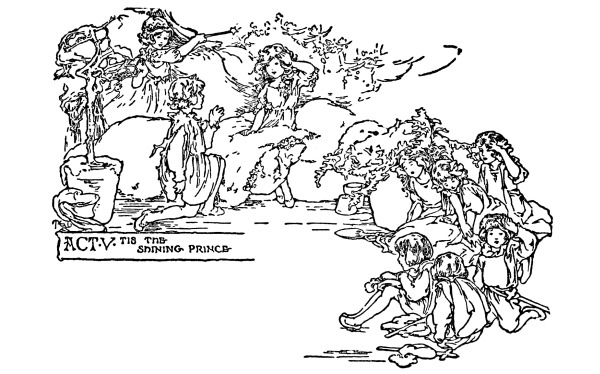
[Pg 161]
[Palace garden. At center of background, Princess lies asleep on a couch. She is covered with a blanket of snow so that only her face is visible. The King and Queen are asleep in their chairs. The Page lies on the ground at the King’s feet. The Lords and Ladies are all asleep in various attitudes to the right. Stage is quite dark; brightens gradually as Prince enters. Mournful music, changing to something bright and spring-like. When the Princess awakes, all the light is turned on. The music suggests the call of birds.]
[Prince enters from front right followed by Spring, who remains shyly in the background. Looks about wonderingly.]
Prince. A court asleep! King, Queen, and courtiers. ’Tis plain that some enchanter here hath cast his spell. [Catches sight of Princess, tiptoes to couch, and stands beside her.] The loveliest maiden ever seen! Why does she sleep? Oh, waken, Lady Fair, and speak to me. I pray you, waken! [Gesture of despair.] What shall I do, she sleepeth still? [He looks at her a long time, bends closer and closer, finally drops on one knee, and kisses her.]
[Every one stirs and slowly awakens. Fairy Spring produces the transformation in the scenery. Princess, in dress of green, with flowers, slowly arises, keeping her eyes fixed on the Prince, who looks at her. Together they throw back the snow covering, showing the other side covered with flowers. They cast it onto the couch.]
[Pg 162] Princess. [Softly.] ’Tis the Shining Prince of my dreams. [Prince and Princess continue to gaze at each other.]
King. [Regarding the Prince with astonishment, to Page.] Who is the noble stranger? Why did you not announce him?
Page. [Rubbing his eyes sleepily.] Indeed, Your Majesty, I did not hear him enter. I think I was asleep.
Queen. I, too, feel strangely drowsy; have I had a nap?
Prince. That you have, Gracious Queen, you and all your court. I doubt not a spell was cast upon you here.
Princess. [Coming forward and speaking dreamily.] I do remember now. I pricked my finger with a needle which an ancient dame did give to me. At once my eyelids closed, but yet I heard her murmur, “Sleep until the Shining Prince shall come.” [Turns and courtesies to Prince, who makes her a low bow.] And that is you, I thank you, sir.
King. ’Tis the evil prophecy fulfilled.
Queen. It must be so. But the long sleep is over, waking-time has come. Our daughter lives, and is more beautiful than ever. Let us[Pg 163] thank the noble Prince [courtesies to him] who has brought us joy, and let us celebrate with song and dancing.
Prince. But first I must ask permission to wed this lovely maid whom I awakened.
King and Queen. We give permission gladly, if the maid herself consents.
Prince. What say you, Lovely Princess, will you marry me?
Princess. I will, O Shining Prince.
[Spring crowns them with flowers. Prince kneels and kisses Princess’s hand. Wedding march. Procession about stage, Prince and Princess, King and Queen, Lords and Ladies, forming themselves in sets for the minuet. Then two other Fairies dance in and take their places on the couch, where they keep time to music with wands. Dance one figure of minuet. If children find this too difficult, the simpler and more lively lancers may be substituted.]
[At conclusion of the dance, all the actors group themselves on the stage and make their final bow to the audience.]
[Curtain]
[Pg 164]
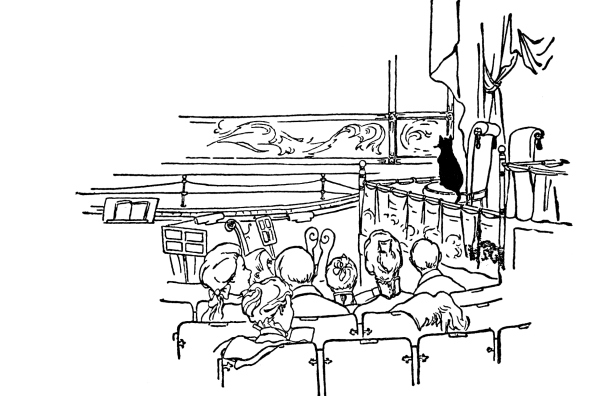
By E. S. Brooks
PERSONS IN THE PLAY
[Argument: Mistress Cicely, from overmuch reading of fairy tales, dreams more of what she would like to be and like to have, than of what she is and has. A curious adventure recalls her to herself and shows her that contentment is better than wealth, and that what we are is often better than what we think we should like to be.]
COSTUMES, PROPERTIES, ETC.
Lord Malapert: Boy of 14. Fancy court suit, over which he wears, at first, a modern duster or ulster, and traveling cap. [Pg 165]
The Seneschal of the Castle: Boy of 16. Sober-colored court suit, white wig and beard; long staff; heavy gilt chain on neck; belt and large bunch of keys. Pompous and important manner.
The Man in the Moon: Boy of 13. Dull-brown tights and stockings; short blouse; long cape; Phrygian cap; long beard; spectacles, cane, and bag; piece of cake for porridge.
Cicely: Bright girl of 11 or 12. Pretty modern dress.
Mariana, and three Maids of Honor: Girls of 12. Semi-fairy dresses; wings; wands; wreaths in hair.
Flick and Flock: Boys of 6 or 8. Fancy dresses if possible, or may be dressed as oriental mutes,—blacked skin; white suit.
For the Chorus of Guards and Vassals: Fancy and fairy dresses.
THE SCENERY
Stage set at first as garden scene. Imitation green mound or fancy garden chair at right toward front of scene. A heavy green curtain should hang behind this and across the stage; this curtain, parting at the time indicated, discloses the castle.
The castle can be made of paper or cloth on light frames. It should be castellated, with open doorway and steps in front. But as no one enters, the castle need not be strongly built. The stage setting can be left to the taste and facilities of the managers.
THE MUSIC
Appropriate music should be played as accompaniment and during waits. The airs for the choruses can be selected by any one familiar with pretty or popular airs. So, too, if there are good singers in the cast, some solos can be arranged, and thus give variety to the performance.
THE PLAY
Cicely discovered—or she may enter and seat herself—reading a book. Lost in reverie, she lets the book fall from her lap, and, clasping her hand behind her head, says (or sings) ruefully: [Pg 166]
[Reads aloud.] “Then the Prince, all glittering in his silver suit, walked rapidly up the palace corridors, past the guards and soldiers, past the vassals and retainers, past the courtiers, the lords and the ladies, past the King and the Queen—all fast asleep—to where on a golden couch the beautiful Princess lay, wrapped in a death-like [Pg 167] slumber. Marveling much at her wondrous beauty, the Prince bent over the closed lids, and, all trembling with eagerness, kissed the half-opened lips.
“With brazen clangor the palace clock struck the hour of noon. There was a start, a murmur, a sudden awakening. King, Queen, and court threw off their century sleep, and passed to their several duties. But the Princess, meeting the beaming eyes of the brave and handsome Prince, recognized at once the hero of her dream, and greeted him with an entrancing smile. Then, rising quickly from her couch, a charming blush suffusing her beautiful face, she took his hand, and leading him to the King, her father, said:
“‘Behold, my Lord, the husband whom the fairies have sent me!’
“And the King, looking upon the young Prince, loved him so exceedingly that he gave them both his blessing.
“So the gallant Prince and the beautiful Princess were married with great pomp and ceremony, and lived happily together ever after.”
[Enter Lord Malapert, in traveling costume; carpet-bag in one hand, compass in the other.]
[Enter Flick with rifle, and Flock with fishing-rod.]
[Kneels at head of couch.]
[See prefatory note about music.]
[Enter Flick and Flock bearing the Magic Carpet—a bright piece of carpeting some three feet square, with long cord and fancy tassel at upper left-hand and right-hand corners.]
[They unroll the carpet. Lord Malapert conducts Cicely, who seats herself upon the carpet, while he kneels beside her, and Flick and Flock stand behind, each at a corner, and hold the tassels. Arrange the group in as pretty a tableau as possible.]
[Chorus begins behind the curtain. Curtain slowly parts, disclosing Moonshine Castle with Guards, Vassals, and Maids of Honor prettily grouped in front; Seneschal in middle.]
[As the chorus ceases, Lord Malapert conducts Cicely to a seat at left, and Flick and Flock gather up the carpet.]
[Exeunt Seneschal and all but Maids of Honor and Flick and Flock.]
[Sinks back in her chair. Exeunt Flick and Flock.]
[Enter Flick and Flock, with the Man in the Moon.]
[Tableau as before. Lord M. supporting Cicely, while the curtain closes during the following chorus:]
[Curtain]
[Pg 188]
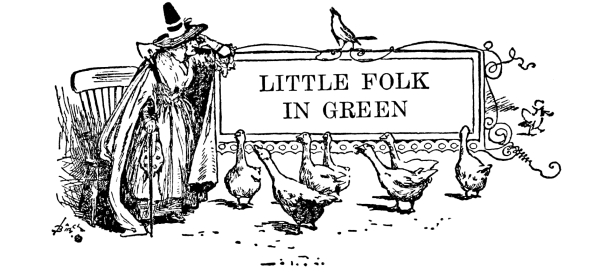
(An outdoor fairy play for children)
By Elizabeth Woodbridge
[Scene. A meadow or grassy spot, with trees and bushes in the background. Enter, young Mother, with very little boy dressed in green. As she speaks an old Witch hobbles in at back, and pauses to listen and peer at them.]
[Mother goes out, looking back wistfully now and again at the little boy. When she is out of sight, the boy sits down in the grass with a toy that she has given him. After a pause, a fairy peeps out from behind a distant tree or bush, then another and another, then many—ten or twelve or more—stealing cautiously forward toward the open grassy spot. They begin to sing, very softly:]
[By this time they have reached the open, where they join hands and dance in a circle, singing:]
[They break up into two groups, and take the next lines antiphonally.]
[They start to run back among the trees, but are checked by the next speech, and draw slowly forward again.]
[They huddle closely together, and speak softly, with furtive glances and gestures toward the child, who does not seem to notice them.]
[Pg 195]
[Pg 196]
[They steal toward him, then suddenly dart forward and join hands in a circle around him, singing softly and persuasively. The child looks up at them and smiles or laughs with surprise and pleasure.]
[They take his hands, and draw him to his feet. One of them sets a wreath of flowers on his head, and another throws one over his shoulders. They draw him slowly back through the trees, singing “We are the fairy folk” until they are out of sight.]
[The Mother appears, gazing back among the trees, and calling.]
[Pg 197]
[Old Witch hobbles in from the other side, and mumbles.]
[Witch starts to go off, the Mother catches her gown.]
[She crouches down behind a tree or bush. There is a long pause. At last, while they are still out of sight, the fairy song is heard again, very faintly, “We are the fairy folk,” etc. As they come in sight they cease singing and tiptoe forward silently, until they are on the edge of the grassy open. There they hover, uncertainly, as if afraid, and sing softly.]
[They come forward, cautiously, and pass near the tree where the Mother is crouching. She springs up and seizes the tiniest of the fairies.]
[They run, then missing one of their number, they turn, and crowd together at a little distance.]
[Some of the fairies run off, during the next speech, and are seen returning with the boy.]
[The Fairies return, with the boy. As they come out on the grass they make a circle about him, and repeat, with one change, their earlier song:]
[They pause, break their circle, so that the boy can see his Mother.]
[She holds out her arms and he runs into them. The captive Fairy, released, runs back to her companions.]
[Fairies run off, while the Mother leads out the little Boy. After the Fairies have disappeared, their song, “We are the fairy folk” is heard once more, very distant.]
COSTUMES
The costumes for this play are simple, but very effective. The fairies should all wear white—ordinary summer dresses do very well. Over these are worn slips made of green cheese cloth. Each slip is made of one piece, doubled and stitched together at the sides and to form the wide kimono sleeves. The neck is cut out low for the girls and left high for the boys, the bottom is slashed up to form points or scallops that show the white dress underneath. The back is slit to allow room for the fastening of the wings.
The wings are made by bending a piece of wire—one continuous piece for each pair of wings—and covering this with pink tarlatan, doubled. They were fastened between the shoulders by tapes that passed around the chest and over the shoulders. Note the point of attachment for the tapes, on the beginning of each wing and not on the wire connecting them. When the tape is fastened only to the connecting wire the wings droop too much. A little experimenting will ensure success. Sometimes, if the adjustment is exactly right, the wings move a little with the motion of the child’s shoulders, and look very real indeed. After the wings are on, a bit of green cheese cloth is pinned across at their base to conceal the attachment.
The little boy was dressed in a green tunic, belted in. The flower wreaths may be made and left on the grass until they are needed, or the fairies may bring them in with them. All the fairies wore flower hats, made of crêpe paper of different colors, slashed in points so that they looked like double tulips. Each cap was of two layers of paper, of contrasting color—blue over white, white over pink, red over yellow, etc. [Pg 206]
The mother’s costume need not be made especially for the play, but it should be inconspicuous in color and simple in its lines. The witch has the conventional peaked cap, hair hanging straight about her face, old shawl, and big cane.
The part of the boy should be taken by a very little child—not more than five years old, and preferably not over four.
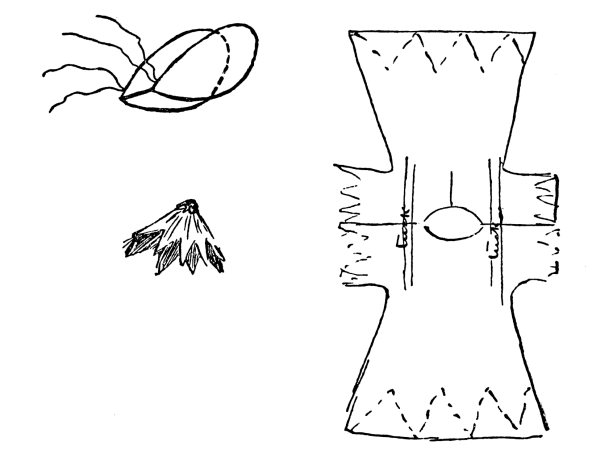
Wire for Wings.
Cap.
Green Slip.
The fairy songs do not necessarily have to be sung, but they are prettier if the children have true enough voices. They should not be sung loud. If they are not sung they may be half intoned in a more or less musical sing-song. The music as written is furnished with very simple accompaniments, such as could be rendered out of doors by guitars or mandolins, or two violins playing pizzicato. As given last year a violin and harp were used, and the result was very beautiful.
[Pg 207]
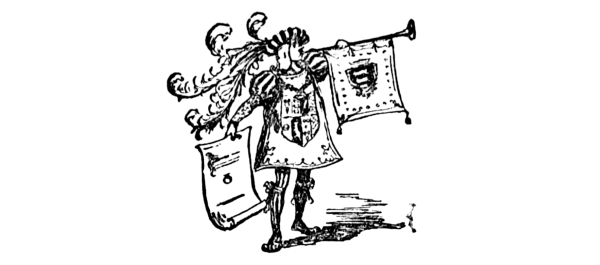
By Maude Morrison Frank
“I received one morning a message from poor Goldsmith that he was in great distress, and, as it was not in his power to come to me, begging that I would come to him as soon as possible. I accordingly went as soon as I was dressed, and found that his landlady had arrested him for his rent, at which he was in a violent passion. I perceived that he had already changed my guinea, and had got a bottle of Madeira and a glass before him. I put the cork into the bottle, desired he would be calm, and began to talk to him of the means by which he might be extricated. He then told me that he had a novel ready for the press, which he produced to me. I looked into it, and saw its merit; told the landlady I should soon return, and, having gone to a book-seller, sold it for sixty pounds. I brought Goldsmith the money, and he discharged his rent....”
CHARACTERS
| Oliver Goldsmith. | ||
| Dr. Samuel Johnson. | ||
| The Landlady. | ||
| Margery, aged 13, | |
The Landlady’s Children. |
| Dick,aged 12, | ||
Time: 1762
[Pg 208]
SCENE
Oliver Goldsmith’s lodgings, Wine Office Court, Fleet Street, London. The walls are discolored, the furniture is old and rickety. The floor, the chairs, and the tables are littered with quantities of ragged books and loose papers.
[Goldsmith, untidily dressed, is striding up and down.]
Goldsmith. [After glancing impatiently at the door several times, opens it and calls loudly.] Margery!
Margery. [Coming in and curtseying.] Did you want for anything, sir?
Goldsmith. Has that graceless brother of yours not come back? Sure it’s above an hour since he set off.
Margery. Oh, sir, Dick has never been so long as that!
Goldsmith. An hour, I tell you, and the half of that besides! He’ll be playing at pitch-and-toss in the court, I warrant you.
Margery. Oh, sir, he’d not do that—not when you sent him so particular!
Goldsmith. Never you be too sure, Margery, of what folks will do or not do. There’s myself now. You’d never believe that I could be so foolish as to sell a good song for a paltry five shillings. [Pg 209] But many’s the time I did it in the old town of Dublin, and climbed the college wall at night to hear the verses sung in the streets too. Then, like as not, some poor soul that needed the money more than I would beg the crown piece from me before I found my way back to the wretched garret where I lodged. But times have changed, Margery.
Margery. [Hesitatingly.] Yes, sir; but, you see, sir, you still—
Goldsmith. [Hurriedly.] Run down to the door like a good maid, do, and see if Dick’s in sight. [Margery goes out; Goldsmith paces up and down restlessly for a moment, then, going to the table, opens the drawer noisily and rummages among his papers.] A plague on all landladies, say I! [In a tone of disgust.] And not so much as an old song left to sell this time!
Margery. [Reappearing, timidly.] Dick’s not to be seen yet, sir. I ran to the end of the court and looked as far as ever I could.
Goldsmith. [Angrily.] A pretty pass for a gentleman like me to be in!—unable to stir beyond the four walls of the room, and very dirty walls they are, too [with a scornful look about him], with that cowardly bailiff sitting on the stairs, like a vile cat ready to pounce at any moment. And, unless Dr. Johnson is as quick to send help as he is to contradict me at the club, I must go to prison, and all because that mother of yours is so vixenish about the trifle of rent. She knows I’d give away my last halfpenny to any one who needed it. [Pg 210]
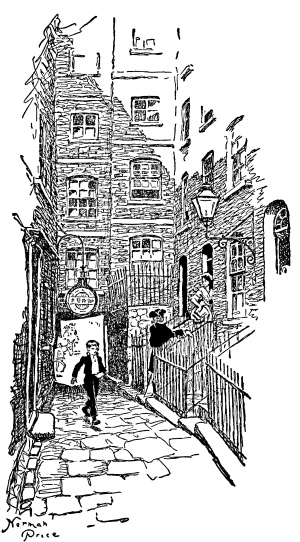
[Pg 211] Margery. [Beginning to cry.] Yes, indeed, sir; but that’s just it! Mother heard the young gentlemen who were here last night talking in the passage about the guinea you’d given them to go to the play; and then, this morning, she only asked for some of the rent because she’s obliged to pay Dick’s fees to Mr. Filby, the tailor, who’s willing to take him to ’prentice and teach him the trade if he finds he’s a likely lad.
Goldsmith. [Excitedly.] But I haven’t another guinea to my name, I tell you!
[Margery sobs loudly.]
Goldsmith. [Dreadfully distressed.] You shall have a whole shilling for yourself, my girl, if you’ll give over crying. But [in a lower tone], faith, I’ll have to get the shilling first!
[Door opens, and Dick enters, much out of breath.]
Dick. I’d a deal of trouble to give the letter to the old gentleman in the Temple. Frank, the black man-servant, said at first that his master, who could write a great book like the dictionary, all out of his own head, had no call to be bothered with forward London lads. Then he made me wait a long time while Dr. Johnson drank tea with [Pg 212] Miss Williams, the little old blind lady that lives there. But at last the Doctor read your letter and gave me this one for you, with a penny for myself. Then he called very loud for a man-servant, and said a lot of things I couldn't rightly understand, the words were so long; but he said “Scatter-brain!” at the end. Could that mean you, sir?
Goldsmith. [Without heeding the boy, hurriedly breaks the seal, and reads.]
My Dear Sir:
Your vexatious situation has awakened the liveliest emotion of sympathy in the breast of one who, while condemning the follies of his fellow men, rejoices in an opportunity of alleviating their miseries. The inclosed piece of gold is designed to meet your most pressing necessities, and I will myself follow your Mercury with as much expedition as I can compass.
I am, sir, your sincere well-wisher,
Goldsmith. [With a deep sigh of relief.] Ah! 'tis a great thing to have real friends. And they're not always the people that have the smoothest tongues, either. The Doctor's rough in his speech, yet there's nothing of the bear about him but his skin. [Remembering the children, with a start.] Here, Dick, old debts must always be paid. I've promised Margery a shilling, and you shall have sixpence. Run and change this guinea at the Green Dragon Tavern, [Pg 213] hard by. [Dick makes for the door.] But, stay! If I must spend the day indoors, at least I'll have some good wine to keep me company. You may as well bring a quart of Madeira, lad, the best you can buy. [Dick goes out.] And, Margery, there's an old corkscrew on the floor in yonder corner. There should be a goblet, too, on the shelf. The other three were broken at our little meeting last night, and the china monster I was always so fond of, too, because Cousin Jane Contarine gave it to me. Ah, well! [Picking up some fragments from the floor and placing them on a shelf.] I'll keep the pieces to remind me of her. [Dick enters, sets a dusty bottle on the table, and takes the change out of his various pockets, piece by piece, with an air of great responsibility.]
Goldsmith. [Without counting the money.] Ah, the boy at last! Here's a sixpence for you, lad. [Dick pulls his forelock and promptly pockets the coin.] And here's your shilling, Margery.
Margery. [Taking it reluctantly.] I'll be sure to tell Mother how kind you are, sir, and then perhaps—
Goldsmith. Perhaps she'll not let the bailiff carry me off to prison? No use hoping for that, my dear, or for any other piece of good luck, for that matter. Poor Noll will never gallop in a coach and six, for all his hard work. But the sun shines sometimes even in Fleet Prison, and here's good wine, for once, to make him forget his troubles, so— [Pg 214]
[Fills a goblet to the brim, lifts it to his lips, but sets it down quickly upon hearing a heavy step on the landing.]
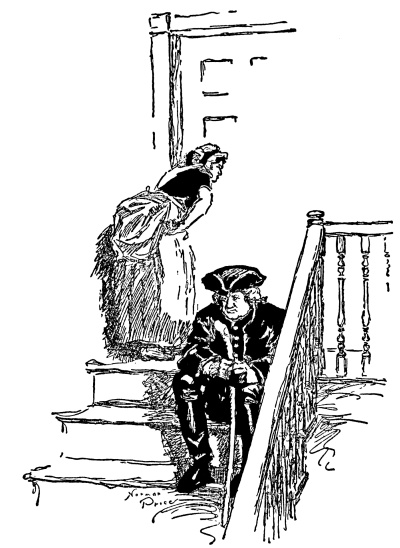
Dr. Johnson. [Outside, in a sonorous voice, heard through the half-open door.] Madam, I am fully aware that Dr. Goldsmith is in an embarrassing situation. I am also aware that your behavior is, in [Pg 215] part, responsible for his embarrassments. If you will have the goodness to refrain from violent recriminations, I will visit him forthwith to investigate these complications. [Advancing to the center of the room with great dignity.] My dear Goldsmith, I trust your messenger reported that I should employ the utmost expedition in coming to your assistance. The existence of a literary man is, I apprehend,—[Coming closer to the table, he perceives the bottle and well-filled goblet, peers at the pile of coins and counts them, snorts violently in disgust, corks the bottle, and then, perceiving the children, says, sternly:] Sir, our conversation need not be extended, but I shall take the liberty of dismissing these young persons.
[Children go out on tiptoe.]
Goldsmith. [Advancing with outstretched hand and an engaging smile.] Nay, Doctor, it'll ill work thumping a poor harmless fellow with hard words when the jade Misfortune has him by the throat. Life has many a dull day for poor Noll, and he could never cure his ills with tea-drinking, either.
Dr. Johnson. [Shaking his massive silver-headed cane indignantly.] Sir, you are impertinent as well as improvident! Disturbed at my sixth cup of tea, barely half my usual allowance, as Miss Williams will testify, I hasten hither only to find that your most pressing necessities are such as can be supplied from the nearest tavern. The gold I despatched by your messenger, as from one literary [Pg 216] man to another, I could ill spare, and, since I find you in affluence [Goldsmith turns out his empty pockets ruefully] and employed in a manner eminently befitting your talents, I will bid you good day without further ceremony! [Paces solemnly toward the door.]
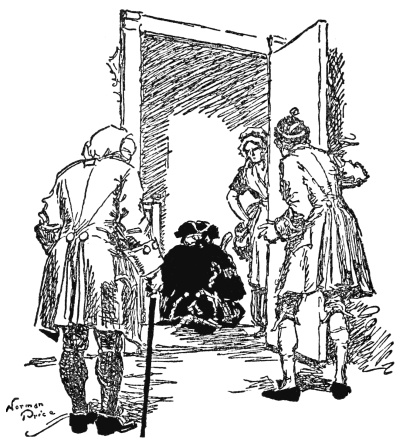
Goldsmith. [Coming forward quickly.] Sure, Doctor, you can never do that! I was always my own worst friend and you my best. Isn't it the sober truth I wrote in the letter, that the bailiff fellow's sitting in the passage, waiting to take me to prison if I once put my nose outside the door? You can see the ugly back of him now. [Pg 217]
[He flings open the door, to the confusion of the Landlady, who has been listening at the keyhole.]
Dr. Johnson. [Ignoring Goldsmith completely.] Madam, it argues an amiable disposition on your part to manifest so strong an interest in Dr. Goldsmith's misfortunes. Have the goodness to enter and favor me with an explanation of these circumstances.
Landlady. Begging your pardon, sir, I'm not a good 'and at hexplaining and such, but when a lone woman 'as two children and heverything to do for them, and gentlemen as 'as guineas to give away promiscuous and owe rent for months don't pay a penny, though the lad's to be 'prenticed and 'is fees found—as good a lad as there is in the court too, though I say it as shouldn't—why, then, one time as well as hanother for the bailiffs, thinks I, when things come to be so houtrageous—[Stops, out of breath.]
Dr. Johnson. [Very sternly, to Goldsmith.] How, sir! Am I to understand that your indebtedness to this good woman has covered a period of months? [Goldsmith opens his mouth as if to speak.] Never bandy words with me, sir! She must be paid, and at once!
Goldsmith. That's like your old kindness, Doctor, and I'll be sure to pay you when I get the next money from my old skinflint of a publisher.
Dr. Johnson. Not so fast, sir; not so fast! Keep your [Pg 218] compliments until they are wanted. For my own guineas I can find worthier employment [glancing meaningly at the table], but you shall set your roving wits to work for the discharge of your debt to this poor woman here.
Goldsmith. But I can't so much as take a step without having that greasy fellow yonder hale me to prison, and no man can write there.
Dr. Johnson. Better men than you have written there, sir, and to the glory of England, too! But your foolish errands can be done for you. Have you scribbled nothing of late that you have not sold before it was finished? No verses? The last—I should be wiser than to tell you—were as sensible as their writer is foolish. Nothing? [Goldsmith shakes his head.] Nay, sit down and look through this heap of rubbish. [Pointing to the open drawer full of untidy manuscript.]
Goldsmith. [Looks blankly at the papers, picks up a ragged rôle, runs through the leaves rapidly, shakes his head, and looks up doubtfully.] I wonder would they give me anything for this? I'd completely forgot it. It's only a poor tale, though I liked it well enough when I wrote it. But I've nothing else.
Dr. Johnson. What sort of tale, sir? Is it a fable? Has it a moral?
Goldsmith. 'Tis about a clergyman and his family. I'd thought to call it “The Parson of Wakefield,” or some such name. I had my [Pg 219] father, rest his soul, in mind when I wrote it; and I put in some of my own mad doings as well. There's comfort sometimes in setting down your own follies in print. It seems like a way of getting rid of them. They're not all so easy to get rid of, though, more's the pity!
Dr. Johnson. Here, sir! Cease maundering and let me look at your nonsense. [Settles his spectacles, sits down in an arm-chair, and begins to read.] “I was ever of the opinion that the honest man who married,” m—m—m—m. [Turning pages.] “The only hope of our family now was that the report of our misfortunes might be malicious or premature,” m—m—m—m. [Turning pages.] “I now began to find that all my long and painful lectures upon temperance, simplicity, and contentment were entirely disregarded.” [Turns pages for a while, seizes his hat and stick, and stalks out without a word. Goldsmith stares at the Landlady in surprise; the children rush in.]
Margery. [Eagerly.] Oh, sir! Will the old gentleman help you? He said, “Thank you, my little mistress,” so kindly, when I picked up his stick just now, that I'm sure he's not a great bear, as Dick calls him.
Goldsmith. [Sadly.] He's a very good-hearted bear, if he's one at all, Margery, and if anything can be made of a worthless fellow like me, the Doctor will do it. But sometimes I misdoubt me that it can be done. [Pg 220]
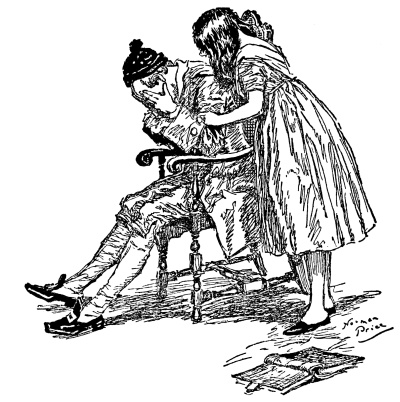
Landlady. [Sharply.] There, now, Dr. Goldsmith, I don't 'old with hany one calling 'imself names! I've 'ad a many lodgers in my time, and take them hall, bad and good, I'd a deal rather 'ave shillings from you, sir, than pounds from the hother gentlemen, for you've always a bit of a laugh about you for me and the young ones, and that halways 'elps a body through the day. But, you see, sir, I was that worried about the lad's fees for 'is 'prenticing that I was maybe a bit 'ard about the rent, but, indeed— [Pg 221]
Goldsmith. Not half so hard as you had a right to be! It's a shameless scamp I am to be giving my guineas to such idle lads as were here last night, and there's none knows it better than myself. A sorry tale my life will be at this rate, with only debts and follies and maybe worse till the end of the chapter—[He buries his face in his hands. Margery steals up behind him and lays her hand timidly on his shoulder.]
[A heavy step is heard, the door is flung wide open, and Dr. Johnson enters, breathing hard, and wearing an air of great importance.]
Dr. Johnson. Madam, what is the exact amount of my colleague's indebtedness to your establishment?
Landlady. Dr. Goldsmith, sir? 'E owes me fifteen guineas, come last Lady-day.
Dr. Johnson. And the officer in the passage? What amount must be expended for the benefits of his presence?
Landlady. It's twelve shillings for the warrant, sir, and the stamp will be three more. 'E'll want two for 'is supper and ale, but I'll not give it. 'E'd best get into an honest business and not come cluttering up folk's 'ouses with 'is great hugly self.
Dr. Johnson. Here are sixteen guineas, Madam, and I desire you to pay the poor wretch's supper. 'Twas by no fault of his that he came here. [Pg 222]
Goldsmith. [Starting up.] Which of the knaves did you talk into giving sixteen guineas for that poor tale? I would never have believed it!
Dr. Johnson. To be sure, sir, it would have been another story had you carried your wares to market yourself, for the booksellers have but an ill opinion of you at present. But there was no fear that any one of them would venture to say me nay, or waste words in cheapening what I chose to recommend. [Impressively.] Mr. Newbery, your former publisher, has been pleased to purchase the work which you intrusted to me, and to send you a remuneration of sixty guineas.
Goldsmith. Sixty guineas! [Sinks back on his chair in astonishment.] Dick, lad, do you hear that? You shall have the finest jack-knife in all Cheapside, my boy, and Margery a new bonnet with flowered ribbons on it, for she was always sorry for me when pence were hard to come by. And I [rising and strutting up and down] shall be all the better myself for a little smartening. I'll have another look at that marvelous pretty plum-colored velvet I saw in Filby's shop last week. He'll be sure to trust me for it if I pay something on the old bill, and—[Stops short, as Dr. Johnson raps violently on the floor with his stick.]
Dr. Johnson. [Shaking his head solemnly.] Nay, sir, a spendthrift you were born, but an honest man I'll make you, if this money [holding up a large leather purse] will discharge your outstanding accounts. There shall be no plum-colored velvets, I promise [Pg 223] you, until justice is done. But [observing the downcast looks of the children] you, my little mistress, shall not be deprived of your finery, nor the lad of his promised toy.
Goldsmith. [Plucking up courage.] Then, Doctor, you'll not leave me without a penny, like Simple Simon in the old rime? Sure, no tradesman will trust me with his wares, either.
Dr. Johnson. [Firmly.] And quite right too, sir. But to leave you four and forty pounds in your present state of mind would be sheer madness. Steady your wits, sir, by making a fair copy of your debts, to show me at five, when Miss Williams shall give you a slice of mutton in the Temple. On your solemn assurance that your creditors shall be satisfied without delay, the balance shall be yours, though it will be wasted on folly, I make no doubt. I have the honor to wish you good day, sir. [Claps his hat on, seizes his stick, and marches out, stopping a moment to pat Margery's curls as she curtseys to him.]
Goldsmith. [With a sigh of relief.] Ah, well! It's an ill wind that blows nobody good. Things looked black enough an hour since, and now, Margery, you'll be monstrous fine in a new bonnet, and Dick the cock of the court with his jack-knife. And I—I'll manage to get that plum-colored velvet—with a taffeta lining, too—or my name's not Oliver Goldsmith!
[Children clap their hands in delight; Landlady shakes her head at Goldsmith disapprovingly.]
[Pg 224]
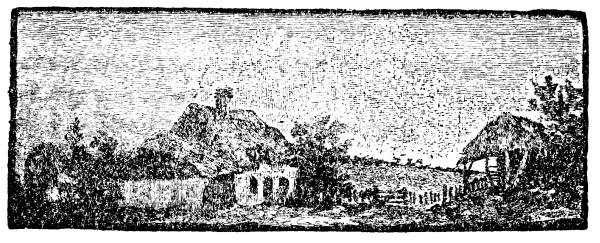
By E. S. Brooks
CHARACTERS
The argument shows that wolves are just as designing, little girls just as heedless and helpful, and the chances of rescue just as possible to-day as at the time of the original Red Riding-hood.
SCENE
A neatly furnished parlor. Jenny discovered dusting furniture, arranging flowers, and making things look nice generally.
[Jimmy Bings appears outside at window (or door, if a window is impracticable); he peers in, looks around; then tries the window, opens it, and enters cautiously.]
[Takes the table-cloth off the table and begins filling it with ornaments, knickknacks, and valuables, looking at each article sharply. Suddenly he stops, both hands full, as if struck by a brilliant idea.]
[Hurries the rest of the things into the table-cloth, stopping occasionally to express his approval of his great plan by sundry slaps and nods. Enter Jenny with a tray of luncheon, nicely set. She stands in the doorway amazed.]
[Door opens suddenly. Johnny Stout bursts in and then stops, astonished.]
Johnny. [Quickly pulling out a pistol from the table-drawer, and pointing it at Jimmy B.]
[He backs J. B. out of the room at the muzzle of the pistol; Jenny listens for a while, and then sinks on a chair and cries.]
[Curtain]
[Pg 240]
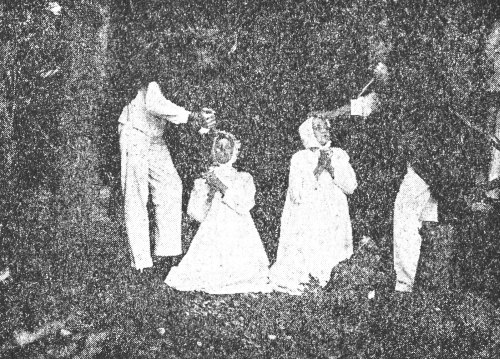
(An Impromptu Musical Tragedy)
By Laura E. Richards
[Air, “The Bold Young Lumberman.” The music may be continuous throughout, the action keeping time with it.]
Characters
[He beckons, and from either side, in cloaks and masks, and armed with daggers, enter Remorseless Fiends.]
[Uncle gives them gold, in bags, and indicates stabbing. They express comprehension. Dance. Curtain.]
[Enter Fiends, dragging Babes. They threaten to kill them, but are disarmed by their pleading; they weep, and sing.]
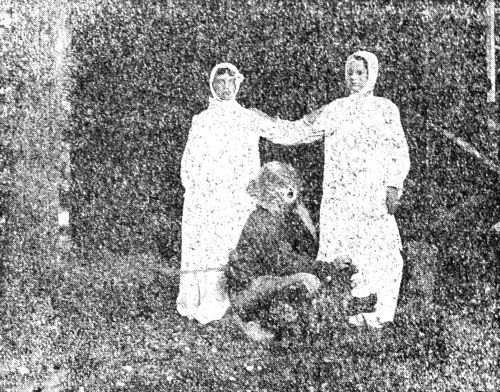
Footnotes:
[1] May be left out of cast without interfering with action.
[2] May be left out of cast without interfering with action.
[3] May be left out of cast without interfering with action.
[4] Mountains, plains, and valleys in the Moon.
[5] Mountains, plains, and valleys in the Moon.
[6] Mountains, plains, and valleys in the Moon.
[7] These speeches can be divided and assigned to different fairies.
Transcriber’s Notes:
The illustrations have been moved so that they do not break up paragraphs and so that they are next to the text they illustrate.
Typographical and punctuation errors have been silently corrected.
This eBook is for the use of anyone anywhere in the United States and most other parts of the world at no cost and with almost no restrictions whatsoever. You may copy it, give it away or re-use it under the terms of the Project Gutenberg License included with this eBook or online at www.gutenberg.org. If you are not located in the United States, you will have to check the laws of the country where you are located before using this eBook.